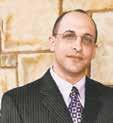








~ ~ Top East Cobb Schools: Sope Creek, Dickerson, Walton Top East Cobb Schools: Sope Creek, Dickerson, Walton










PUBLISHER
MICHAEL A. MORRIS michael@atljewishtimes.com
EDITOR & MANAGING PUBLISHER
KAYLENE LADINSKY kaylene@atljewishtimes.com
Execuitive Assistant
RONIT FRANCO-PINSKY ronit@atljewishtimes.com
EDITORIAL
Managing Editor
SASHA HELLER sasha@atljewishtimes.com Staff Writer & Proofreader
FRAN PUTNEY fran@atljewishtimes.com
Interim Online Content Coordinator
ROBERT GARBER robbie@atljewishtimes.com
CONTRIBUTORS THIS ISSUE
ALLEN H. LIPIS BOB BAHR
DAVE SCHECHTER
DAVID OSTROWSKY
DEBBIE DIAMOND
MARCIA CALLER JAFFE
ROBYN SPIZMAN GERSON
ADVERTISING
Senior Account Manager & Team Supervisor
MICHAL BONELL michal@atljewishtimes.com
Account Manager ILYSSA KLEIN ilyssa@atljewishtimes.com
CREATIVE & DESIGN
Creative Director LILLI JENNISON lilli@atljewishtimes.com
COMMUNITY ENGAGEMENT
Events Director JACQUELINE MORRIS jacqueline@atlantajewishlifefoundation.com
Atlanta Jewish Connector Coordinator DIANA COLE diana@atljewishtimes.com
GENERAL OFFICE
ROBIN FREEDMAN info@atljewishtimes.com 404-883-2130





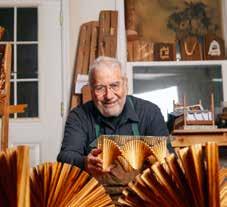

By Sasha Heller
With every passing week, it seems the rising tide of antisemitism in America crests at new heights. Whether it’s a Georgia doctor spreading anti-Jewish messages on social media or Kanye West releasing an album laced with Nazi propaganda, American Jews face an uphill battle every day and can only expect continuing waves of Jewish hate until the narrative and rhetoric are forced to change.
In a letter sent to various media outlets and organizations, Torri Heffler, director of property management for Pocono Rental Management, exposed the toxic social media footprint belonging to Dr. Jehangir Pirzada, an emergency medical physician employed by ApolloMD and currently working at Wellstar Spalding Regional Hospital in Griffin.
Heffler writes, “Dr. Pirzada has used his public social media platforms to repeatedly promote deeply disturbing, anti-Jewish conspiracy theories, Holocaust distortion, and terrorist sympathizing


propaganda — rhetoric that is not only hateful and historically revisionist, but extremely dangerous when espoused by someone entrusted with the care of vulnerable patients.”
Heffler added that Dr. Pirzada shared material invoking Jewish global
While Southern hospitality and charm seem hard to find in some parts, you’ll experience them every day at Somerby Sandy Springs Senior Living. Let us take care of the daily chores while you explore the best of nearby north Atlanta. Or stay home and enjoy our beautiful, multi-lifestyle community with a recent multi-million dollar renovation. Best of all, you can enjoy engaging events, endearing neighbors, and a chef prepared meal that’ll remind you of how charming life can be at Somerby.
Experience a superior level of hospitality and attention to detail that some have all but forgotten. Call (256) 579-0001 to schedule your personal visit.
control and political manipulation, accusing Jewish organizations of “running the U.S.” He has compared Israel to Nazi Germany and refers to Israel as “Israhell,” and suggests Hamas are “freedom fighters.”
“This is not just hateful rhetoric


— it’s a breach of ethical standards for any practicing physician, especially one in emergency care,” Heffler writes. “Dr. Pirzada is entrusted with the lives of vulnerable, unsuspecting patients, some of whom may be Jewish or Israeli. His publicly professed beliefs about Jews raise

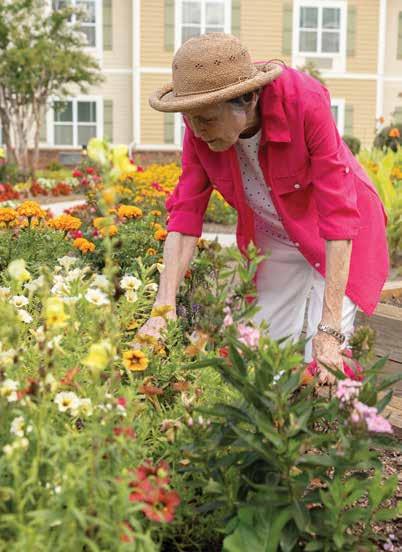

By Marcia Caller Jaffe
Excitement from this year’s Tasting Experience continues to resonate throughout the community — and if you were among the 720 guests who packed into The Stave Room on May 1, you already know why. The food? Show-stopping. The drink and desserts? Next-level. The vibe? Electric. From the first bite to the final bidding war at the silent auction, this beloved annual fundraiser from Jewish Family & Career Services (JF&CS) was bursting with flavor, joy, and community spirit.
But beneath the glitz, glamor, and gourmet grazing, every ticket, toast, and cheer supported something far greater: the vital programs that empower adults with Intellectual and Developmental Disabilities (IDDS) to live independently, find meaningful work, and shine in their communities.
“This is more than an event — it’s a celebration of our mission and the people at the heart of it,” said JF&CS CEO Terri Bonoff, who welcomed the crowd

and gave special thanks to event cochairs Michele Hirsch, Louise Samsky, and Michelle Simon. She also reflected

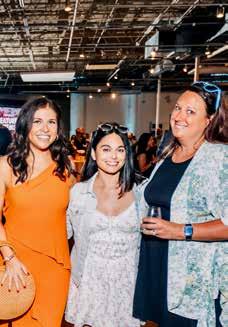
on the spirit of Yom Ha’atzmaut, Israel’s Independence Day, and its themes of resilience and community strength — values echoed throughout the evening.
That spirit came to life in one of the night’s most moving moments, when Bonoff introduced Susan Berch as the 2025 Champion of Inclusion. A former JF&CS client and now a longtime staff member, Berch was honored for her courage, dedication, and advocacy for herself and her peers to help make the world more inclusive for those with disabilities.
Berch shared, “It made me feel proud, and I was overwhelmed. My favorite part was seeing my friends and family. My cousin came all the way from Birmingham to be with me. I love the award itself, and it sits on my coffee table. I feel appreciated (at JF&CS), that people appreciate what I do. If I can help people out, it makes me feel wanted and like I belong.”
Hirsch, Samsky, and Simon added, “As event co-chairs, we were especially moved to see JF&CS truly walk the walk when it comes to inclusion. Honoring Susan Berch — someone who has dedicated 30 years to the organization — with the Champion of Inclusion Award was incredibly powerful. It made us all feel even more proud to be part of this year’s Tasting Experience Team.”
The real showstoppers of the night? The Tasting Experience Choir — a powerhouse group of 14 IDDS clients and four Direct Support Professionals who brought down the house with a set of
rock anthems from Journey and Phil Collins, while closing with a song to celebrate Israel’s Independence Day. Dressed to the nines and full of pride, the choir was a living, singing testament to the evening’s purpose.
The night offered no shortage of indulgent eats and sips. Guests moved easily through the space, with beverages set up in the center of the main room and food vendors lining the perimeter — no long waits, just good conversation and even better bites. A cozy dessert lounge in a side room provided the perfect retreat, where guests relaxed with sweets and drinks.
Stuart Fierman of Fifth Group Restaurants welcomed guests at Alma Cocina and Lure with Seared Tuna Tacos and Salmon Gravlax. Erin and Moshe Lis of Added Touch Catering dished up a spicy curry stew, while Tal Postelnik Baum of Oliva Restaurant Group arrived with Noam Laks as they represented her Buckhead seafood concept, Carmel, with refreshing Tuna Tartare.
Other highlights included longtime favorite Les Retter of High Roller Sushi, who noted that Atlanta’s film and golf scenes have his business “lit,” and Pricci’s chef Jonah Jacobson — an alumnus of both the Weber and Epstein Schools — who served Dill-Cured Wild Salmon on Pizelle with Crème Fraiche.
Three rising stars made strong debuts: Chef Matt Marcus teased his upcoming Roswell restaurant, Truth Be Told, with an inventive, “Watermelon x2,” and gazpacho pairing. Tre Vele’s


Mike Davis also delivered a memorable watermelon dish. East Cobb newcomer Reunion made its mark with tomato gazpacho shooters from Ilene Kapper Oxman, her daughter, Aly, and Executive Chef Santiago Echavarria. And in a crowd favorite, Liat Tzionov of The Crazy Apron served a quartet of traditional Bukharian dishes, showcasing flavor, heart, and heritage.
Guests sipped their way through wines and spirits curated by Mark Brown of The Wine Shop, and those skipping the alcohol enjoyed “Yom Ha’atzmaut Mocktails” like Pomegranate Spritz and minty Limonana.
The silent auction buzzed with excitement, showcasing items such as art, jewelry, experiences and more. One dazzling piece — a Swarovski Crystal ‘Star of David’ purse — sparked a bidding frenzy and a lot of admiring glances. JF&CS clients proudly presented their own creations in the “Artist Collective.”
Longtime attendees Harold Cohn and Mark Kopkin lingered at the NFA

Burger station. “This is my 20th Tasting,” said Kopkin, president of the Jewish National Fund. “It just keeps getting better.”
Whether you came for the cuisine or the cause — or both — The Tasting Experience proved once again why it’s one of Atlanta’s most anticipated annual events. The joy in the room was unmistakable, the sense of purpose even more so.
“The Tasting Experience was a resounding success — made ever so special by the outpouring of attendees, the delicious food, and our extraordinary clients whose voices of song brought down the house! Thank you to our outstanding chairs, event committee and JF&CS staff,” said Bonoff.
Couldn’t make it this year? You were missed — but it’s not too late to be part of the impact. Visit jfcsatl.org to support IDDS programs that empower lives every day, and mark your calendars now: The Tasting Experience returns April 30, 2026.
JF&CS Marketing contributed to this report. ì
By Marcia Caller Jaffe
Intown Cares hosted Heart & Home, its 12th annual gala, on May 2, at The Atlanta History Center. More than 350 corporate and community leaders and Intown Cares stakeholders came to recognize their good works, volunteers and leadership.
One who stands out is Atlanta native Aaron Chaiken, Intown Cares Board Chair. Their tikkun olam mission is to prevent and reverse homelessness and hunger specifically in Intown Atlanta.
Chaiken said, “We deliver dual programs to help neighbors navigate the journey to housing and food. We deploy one of the most effective homeless services teams and operate one of the most innovative low-barrier food distribution programs in the Atlanta area.”
By the numbers, in 2023, Intown Cares achieved two impactful milestones: 1,000,000 meals distributed, and 1,000 clients housed. In 2024, they helped 231 clients move into permanent housing and distributed 498,019 meals.

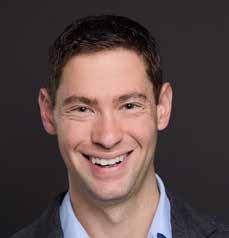
deliver dual programs to help neighbors navigate the journey to housing and food. We deploy one of the most effective homeless services teams and operate one of the most innovative low-barrier food distribution programs in the Atlanta area.”
Intown Cares was founded in 2010 as Intown Collaborative Ministries, a cohort of faith communities that operated a food pantry. Those faith communities included Shearith Israel, and Rabbi Hil-
lel Norry was a founding board member. Over the years, as the mission expanded, they began helping those who have long lived on Atlanta’s streets find permanent housing.
Chaiken said, “Today, we still receive vital support from our original supporters, as well as government grants, foundations, businesses, community partners, and individual donors. While the work



at the heart of Intown Cares remains unchanged since our founding 15 years ago, our dual programs, whom we support through our expanded service area, and the partnerships we maintain, represent an evolution of the organization.”
Chaiken learned about Intown Cares through a coworker who was on their board. He joined the board in early 2020, noting his first board meeting was also the first week of the COVID lockdown. In applying his Jewish values, he said, “It’s about showing up with care, dignity, and joy. Volunteering in homeless encampments and at the food pantry, I’ve learned that support isn’t just giving — it’s also about how we connect. Sharing a smile, listening, laughing together — those small moments reflect the deeper values I have tried to bring, and I see Intown Cares’ team members bring every day.”
Chaiken is most proud particularly of how they consistently adapt to new challenges such as the rapid-fire immediate reaction to COVID and partnering with the CDC to share information in both directions early in the pandemic. Secondly, he shared, “It’s terrific how well Intown Cares partners with so many other organizations in the homeless services and food community in Atlanta … Intown Cares has more partners than we have room for here, but some of our closest partners include the City of Atlanta and Mercy Care.” Currently, they have 30 deeply com-

Robert M.
West Point, 1982: University of Michigan Law School, 1990: Member of Wealth Counsel and national Academy of Elder Law Attorneys, Accredited Veterans Administration Attorney

MYTH: “Elder law attorneys can only help us with trusts and wills” FACT: We do so much more
Robert M. Goldberg & Associates Provides:
• Wills, trusts & estate planning
• Financial powers of attorney
• Health care advanced directives
mitted staff members. They prioritize hiring folks with lived experience, which results in more client empathy. At the AHC event, videos were shown of appreciative clients whose lives were improved, if not permanently altered for the better, by the organization.
Board member and past Board Chair, Joanna Genser said, “The Torah commands that a poor person be granted ‘sufficient for what lacks, according to what is lacking to him.’ Intown Cares has a deep commitment to treating all of our neighbors with loving kindness … this organization helps me fulfill my responsibility as a Jewish person.”
Chaiken grew up in Sandy Springs and attended Congregation B’nai Torah. He graduated from Greenfield Hebrew Academy and Yeshiva Atlanta High School, then earned a BA from the University of Chicago, and later an MBA from their Booth School of Business. Currently, he works at Bain & Company in consulting and talent management roles as VP of Americas Consulting Programs. He lives with wife, Tal, and two children, Jordan (7) and Maya (4), in Candler Park, and are members of Congregation Shearith Israel. He noted that community leaders Aaron and Angel Goldman are champions of Intown Cares with Perennial Properties serving as a Heart & Home sponsor.
To get involved, please email development@intowncares.org. ì
• Medicaid & VA benefits planning and applications
• Asset preservation strategies
• Guardianship/conservatorship
•Probate/trust administration
Elder law is about living your best life today while planning for tomorrow
Our firm has focused on Estate Planning and Elder Law since 1999, helping thousands of Georgia clients protect what matters most
Call 770-229-5729 to schedule your “Discovery Meeting” or visit www.goldbergestateplanning.com to register for a webinar to learn more about how our firm HELPS families protect everyone and everything they love
Robert M. Goldberg & Associates
Atlanta - Peachtree City - Zebulon & Virtually Throughout Georgia
By Marcia Caller Jaffe
Some say “dove” (into the swimming pool), some say “dove” (like the bird of peace), but on May 4, admirers came to salute Dov Wilker, regional director of the American Jewish Committee Atlanta/ Southeast (AJC), as the “man of the hour.”
Approximately 650 attendees filled the Woodruff Arts Center, beginning with a full buffet dinner catered by A Kosher Touch. The crowd then transferred into Symphony Hall where a rousing gospel-like choir performed “Rise Up” with singers from The Temple and Ebenezer Baptist Church.
In the pre-function, AJC board member Steve Labovitz told the AJT, “There are few directors of any Jewish organization who could command this crowd. It’s a tribute to both Wilker and the AJC.”
Beginning the formal program, Rabbis Loren and Micah Lapidus (event chairs) performed the “Shehecheyanu” and referred to Wilker as the” ultimate leader and mensch.”
AJC President Belinda Morris intro-



duced a video of Mayor Andre Dickens recognizing Wilker’s “remarkable leadership in building bridges lifting up diverse




communities.”
Morris touted AJC successes like the Unity Seder with 350 guests, more than 100 global forums, and Wilker’s strong personal relationships with dignitaries. She said, “I enjoy Dov’s joy and snarky humor which made my job so easy.” She urged all leaders to bring the 59 remaining hostages home.
Event chairs Matt and Gabby Spatt shared that Wilker was an inspirational friend enjoying family swims and barbecues.
circle having met at an AJC event 17 years ago. Evan touted Wilker’s friendship for things like volunteering to help him move. “Dov knows how to celebrate and laugh at himself.”


Pristine condition just two blocks from Peachtree on an acre lot
Newly resurfaced tennis court, gazebo for al fresco dining, parterre rose garden
Elevator to all floors, party size bar, charming sunroom
Spectacular primary bedroom suite with king size new accessible bath
In one of his favorite settings, Wilker sat alongside Ted Deutch in a relaxed fireside chat. Deutch, a former senator from Florida, serves as the AJC’s overall CEO. He hammered that more than 500 leaders around the world should be giving voice to the hostages. When queried by Wilker about antisemitism, Deutch maintained that post-Oct. 7, society atlarge should be concerned, “not just Jews, for the betterment of all Civil Rights.”
Wilker was complimented for his partnership with the Black Jewish Coalition. He spoke of the AJC’s role of not just educating but taking students to Selma, Ala., and the U.S. Holocaust Museum. “Friendships are more important than content in a teen program.”
Wilker explained that he wears a kippah to show “that he is Jewish and proud.” Wilker complimented Deutch’s Twitter feed for boldly stating that he was a “Zionist and Jew which is unique among peers.”
Event chairs Lindsay and Evan Borenstein relayed that they had come full
The showstopper was a movie made by local filmmakers Jacob Ross and Adam Hirsch, poking fun at Wilker and ending on his successes. Atlanta Jewish Film Festival Executive and Artistic Director Kenny Blank introduced the entire spoof with an original song, “Dovin,” showing Wilker biking, imitating his guffawing laugh, King Jew, and Big Bear (“dov” in Hebrew). The movie within a movie had amazing technology and graphics with Wilker roaring like the MGM lion, Dov’s face superimposed as Tevya from “Fiddler on the Roof.”
In addition to Wilker’s mother, Simone, Sandy Springs Mayor Rusty Paul and longtime community leader Sherry Frank took fun shots and complimented Wilker. An excerpt from an older speech showed Wilker referred to the difficulty he felt after Oct. 7 on Day 41. Simone gushed that Dov’s late father would be proud of the man he is today. Israel Consul General to the Southeast Anat SultanDadon found Dov “approachable.”
Certainly, the most emotional sequence closing the program was Wilker’s wife, Julie, and two daughters. With Kleenex in hand, they spoke of him not being able to go out without being recognized, “Even the owner of Goldberg’s, and the server knows his name and order,” said daughter, Avigail. Julie stated even in Timbuktu or Mt. Everest, he finds some-
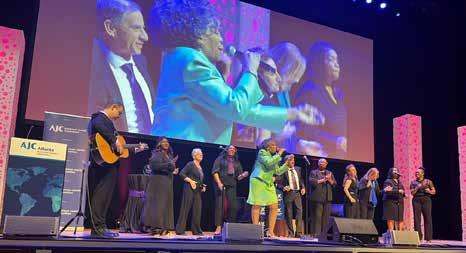

one he knows.
More importantly, they spoke of Wilker’s deep and meaningful connection to the Jewish people and his family. “His drive, passion and love for Israel and doing what’s right.”
Tearful himself, Wilker shared, “Tonight, I can say that Atlanta truly is my home.”
He relayed the importance of taking his children to the March on D.C., imprinted from when his father did the same for Soviet Jewry. He then recited a song about not staying silent. “I have never been more humble ... Bring them home!” ì




By Debbie Diamond
Shai Davidai insists he’s a “nobody” despite the palpable excitement from the 300 attendees who clung to his every word at the recent JNF-USA event, “Standing Strong with Israel.”
The Columbia University professor, well-known for his outspoken advocacy for Israel and fight against antisemitism on university campuses, believed someone would speak out about the encampments that sprung up at the Manhattan campus on April 17, 2024, six months after the terrorist attacks in Israel. When no one came forward, he realized he needed to be that person. And the rest is history.
“There were 25 people in attendance when I spoke before a group of students. Someone videotaped the speech, and the next day millions of people had watched the video. I’m not courageous or brave. I’m just someone who spoke up, and it resonated with people around the world,” Davidai explained.
Shortly thereafter, Davidai was suspended by Columbia, whose administration continues to maintain his freedom of speech was not being limited. Instead, they point to allegations of harassment and intimidation of university employees by Davidai. In one video, Davidai confronted Cas Holloway, the university’s chief operating officer, stating “You have to do your job. And I will not let you rest if they won’t let us rest.” Israeli and Jewish students were physically blocked from entering buildings and green space as the pro-Palestinian protests and encampments took hold at Columbia.
Currently, Davidai is trying to make sense of the despair felt by millions since the attacks in Israel. And he continues to rally against the hate directed toward Jewish students at American college campuses. He has experienced the anti-Israel and anti-American sentiment firsthand during his travels, but he has also found the strength of the Jewish community, which he describes as “something beautiful.” He believes that most of the hatred comes from ignorance. By providing factual information to those who are open to respectful discourse, he believes viewpoints may be altered through one-onone conversations.
Davidai knows that he is not alone in what he has faced. “Other professors have sent me notes and emails indicating they are experiencing the same treatment. University officials are allowing this situation to happen. The tenure


system needs to be revamped or eliminated,” he said. Citing Joseph Massad, the Columbia professor who described the Oct. 7 attacks as “astounding, awesome, and incredible,” Davidai mentioned that Massad continues to teach at Columbia as a tenured professor. In fact, Massad is currently teaching a course on Zionism and attended a conference in Turkey with Hamas leaders in 2024.
“After the Oct. 7 attacks and up to the present time, I realized that there are people who see our mere existence anywhere in Israel as wrong. When May 15 (the day after the modern state of Israel was established in 1948) is commemorated by many as the Nakba (catastrophe), I have to compare it to those who would say July 5 is the worst day in American history. This sort of sentiment has taken root at many of the Ivy League schools,” said Davidai.
Davidai recommends high school and college students experience Israel firsthand through educational programs. “Kids who have been in Israel stand taller on college campuses. They don’t have to read about what is happening – they experience it. This connection strengthens them more than anything,” he stressed. He cited Alexander Muss High School in Israel and Caravan for Democracy,
two JNF-sponsored programs that help educate Jewish and non-Jewish students about Israel, as important initiatives for learning and understanding.
Social media has also played a role in shaping viewpoints, Davidai contends. He mentioned a statistic indicating that anti-Israel content is now 47 times more prevalent than pro-Israel material on TikTok. “Students are being brainwashed by what they see on social media, including TikTok,” he said. “Most students are receiving information from many social media sites, including TikTok. We also know that peer pressure for young people is high, and no one wants to be pushed out or excluded from a group for questioning a prevailing opinion. With extreme anti-Israel demonstrations the norm on some college campuses, it’s inevitable that students will take part in order to fit in,” he said.
“The teen years are transformative in terms of a lifetime Jewish identity. We were very pleased with the program and thankful that the Zalik Foundation, the Helen Marie Stern Foundation and other sponsors made this event possible for our community here in Atlanta. Samantha Weidenbaum, a member of our Atlanta board of directors, exhibited true leader-
ship in advocating for our sponsorship of this initiative with Shai Davidai,” said Beth Gluck, executive director of JNFUSA Southeast.
Davidai offered the following insights and advice to those in attendance and in the larger Jewish community:
• Be a voice to speak out against antisemitism. Everyone has the potential to make a difference.
• Tap into your Jewish identity. There is strength in being part of a strong community.
• Educate yourself and your children about our shared Jewish history and culture.
• Remember that as Jews we all have a connection to Israel.
• Speaking one-on-one with someone is worthwhile only if they have an open mind. Also, it is not the job of our teens to change people’s minds.
Weidenbaum also spoke at the event, calling Davidai a “true hero and passionate advocate.” At the start of the event, Consul General of Israel to the Southeastern U.S. Anat Sultan-Dadon recognized the number of days in captivity for the hostages and acknowledged Davidai as a “voice of moral clarity in an upside-down world.” ì
By Bob Bahr
Outward Bound USA is the recipient of a $15 million grant from the Arthur M. Blank Family Foundation. The donation, the largest single gift in the organization’s 63-year history, will be used to expand its Advancing Access to the Outdoors Initiative that combines outdoor education programs with character building skills particularly for a diverse population of students across the country.
It will also be used to develop a new Center of Excellence that will further develop programs in all nine regional Outward Bound centers and expand the fiveto seven-day immersive programs that the organization uses to develop leadership and self-reliance at 20 outdoor sites. It will also expand its less intensive oneday programs for schools and community organizations. The organization hopes to reach 75,000 young people each year and boost its nationwide alumni base to 275,000 students by 2029.
It would be a big jump in participation and financial resources for the organization which in recent years has had an annual budget of around $10 million.
In announcing the gift, Arthur Blank, chairman of his family foundation and the co-founder of The Home Depot, praised the organization for the contributions it has made.
“Outward Bound has had a profound impact on my life, teaching me the invaluable lesson that we are all capable of far more than we realize. Outward Bound USA has consistently demonstrated excellence in fostering the courageous leaders of tomorrow through the transformative power of outdoor education.”
By its support for the new Center of Excellence and expanding its programs in local communities, the organization hopes to increase participation by minorities and others who have had limited access to its outdoor program. The organization, in acknowledging the gift, mentioned that it comes at a critical time for making sure there is fair access to its programs that help young people to build their future life.
The CEO of the organization, Ginger Naylor, said the grant will particularly help those who have not had the financial resources to pay for its programs or limited opportunities to fully experience an Outward Bound adventure.
“This grant directly enhances our ability to expand our programs into communities across America,” Naylor emphasized, “empowering more youth

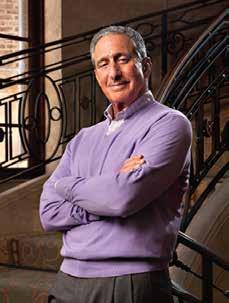

— especially the 90 percent of families currently unable to afford an experience like Outward Bound — to build confidence and reconnect them to themselves, others, and with the natural world.”
Outward Bound is an international organization that, in addition to its programs in this country, has programs in 34 other countries with a total participation of a quarter of a million people annually.
It was founded 83 years ago in Scotland during World War II on principles developed by Kurt Hahn. He was a German Jewish educational innovator who left Germany in 1933 when the Nazis came to power.
Originally, Outward Bound was started during World War II to sharpen the survival skills of young merchant seamen who might be cast adrift in the open ocean after their cargo ships were torpedoed. “Outward bound” is a nautical term for a ship leaving port for what
may become a voyage with an unknown destination.
One of its early leaders was a sailor whose leadership skills and resourcefulness managed to keep his crew alive and intact until they were rescued after 35 days in their lifeboat.
Today, in addition to its short programs, the organization offers what they call an Expedition, a program of 30 days or more that focuses on developing within students’ confidence and commitment in their life.
Blank first encountered the organization early in the history of The Home Depot as he was grappling with many of the issues that the rapidly evolving organization presented. He was invited by Marjorie Buckley, who, with her husband, was an early investor in the company.
“Of all the organizations I’ve been connected to, Outward Bound has had the most significant impact on my life,” Blank acknowledges. “How do we integrate that philosophy? To serve, to strive, and not to yield is very much a part of everything we did at Home Depot.”
Blank carried over these values when he retired in 2003 to found the AMB Group, which owns the Atlanta Falcons, Atlanta United soccer team, and PGA Golf Superstores. It also manages and was instrumental in developing the Mercedes-Benz Stadium, one of the world’s leading sports and entertainment venues. ì
She invited him to participate in the North Carolina Outward Bound School that was based at Table Rock Mountain in the Pisgah National Forest. He credits the experience with helping him to develop the personal philosophy, with cofounder Bernie Marcus, that was instrumental in providing the corporate values upon which The Home Depot thrived.
By Marcia Caller Jaffe
On May 1, photographer Debbie Zimelman captured the bravery and resilience of women in the Israel Defense Forces (IDF), as she shared her book, “Women on the Front Lines,” to match the spirit in the room of 160 females devoted to the Jewish National Fund, specifically the Women for Israel division.
Campaign chair Miriam Haviv shared, “Our goal of $900,000 represents 45 percent of Atlanta’s overall goal.”
Event co-chairs Connie Frankel and Barbara Kaplan, both Sapphire members contributing $5,000-plus to JNF, welcomed the group. Relating the strength of IDF women, they called up Robin Lubin, mother of the late Lone Soldier Rose Lubin, who perished in the Old City defending her post. She recited the Prayer for the People and State of Israel.
Next up was (soon-to-be outgoing) Israel Consul General to the Southeast Anat Sultan- Dadon who started by relating the 1948 historic document and language in Israel’s irrevocable charter and
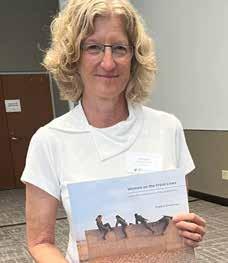
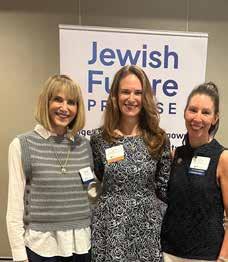
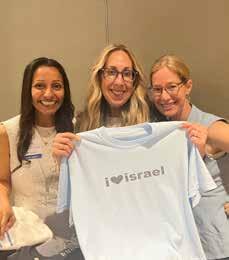
recognition statement, “Seventy-seven years ago, this was a culmination of our 2,000-year-long struggle. Jews never lost hope of regaining sovereignty … now Israel is a superpower bringing technology to the world.”
• Discounted Rates
• Hourly and Live In Caregivers
• Driving to Errands/Appointments
• Exercise/Social Activities/Mind Stimulation
• Meal Planning/Preparation/ Cleanup
• Light Housekeeping/Laundry
• Medication Reminders
• Assistance Showering/Dressing
• Hospice Support
• Short Term and Long Term Caregivers
• Condition Specific Caregivers
Extensive Background Checks on All Caregivers Committed to Your Safety


She explained the reality of Oct. 7 with Hamas “not seeking compromise on real issues like Jerusalem or water -- but their issue is our very existence!”
Caryn Berzak, Women for Israel Steering Committee, spoke of the tragic death of last year’s dynamic keynote speaker at this very same event, Olga Meshoe, former CEO of Defend, Embrace, Invest Support Israel, who died suddenly.
Staci Libowski, Women for Israel co-chair, shared how JNF is developing a new medical center. “A project, for example, in the north would not just provide lifesaving medical services and care, but also jobs and a transformative powerful circle of impact.”
She then had each woman put on a blue and white neon bracelet, remove it to attach to the others at the table, and compose a more substantial halo over the table.
Guest speaker Zimelman showed fascinating slides from her book illustrating her photographic role of “being a fly on the wall,” having been allowed into extremely secure spaces to observe Israeli women. She established herself initially by pitching a story to Hadassah Magazine, “Suited for Action.”
Her first slides depicted women in prison, where she spent two days a week for a year. Those photos ranged from glam to poignant and pushed us to ponder their crimes. Stunning images followed of IDF soldiers using tents, makeshift showers, guns, tanks, base camp, in the desert, and being assigned an IDF dog for life. Zimelman told of her own experiences like driving three hours into the Negev to interview a soldier who was
otherwise engaged and not available. She said, “I just learned to go with the flow.”
She talked about the scariness of sleeping on a top “dorm” bunk with various girls crying and trying to help each other. Then on Oct. 7, women battled in tanks or as rescuers. “They showed that women belonged. They were among the first 70 combat paramedics inside Gaza. They ran into collapsed buildings. One tank unit drove 40 kilometers and eliminated 50 terrorists.”
One of the most fascinating photos was of a geometric looking rock structure that the soldiers assembled each day where they slept like spoons and had special bathroom equipment -- not able to “go” outside during the day. She showed a photo of high school girls who gave up their Passover vacations to hyper train and prepared for selection into extremely skilled elite units upon IDF formal drafting.
Zimelman ended by musing, “I was from Rockville, Md. Then I went to Israel at 22 when I was too old to serve in the IDF. I can only imagine what that would have been like.”
Natasha Libowitz, co-chair of Women for Israel, closed the event by saying, “[Donating to JNF] is making a difference to the body and soul of Israel, yesterday, today and tomorrow.”
A bounteous Israeli lunch was prepared by EB Catering with falafel, fries, spicy kale salad, fennel slaw, humus, tahini, Fattoush salad, sweet marinated olives, Moroccan carrots, salmon avocado wraps, chicken shawarma, and ending in Kadur chocolate truffles. Each individual table sign represented an IDF unit. ì
By Marcia Caller Jaffe
Bonnie Kwatnez and Elizabeth Glass welcomed a crowd of 160 to the Spring Luncheon and Board Installation for the Auxiliary of the William Breman Jewish Home.
On Tuesday, April 29, volunteers and staff were thanked for “giving their hearts and selves with sensitivity and joy leading to personal touches for residents.”
The “star” of the luncheon was longtime volunteer Sherry Habif who was honored with the Lifetime Achievement Award.
Sheryl Eisenberg, outgoing chair, spoke of the Auxiliary’s focus on engagement for residents, touting a list of past activities like Game Day, Chanukah party, baking cookies, improved gift shop, concerts and farm animal visits. She spoke of new AI technology to treat cognition issues, preserve memories and help find purpose and stimulation. As she exits her role, Eisenberg will head the nominating committee. She concluded, “We give, we help, we smile.”
Incoming senior chair Mindy Sard thanked Beth Friedman for advancements with the gift shop. She thanked those “rolling off” the board for their willingness to serve. Sard thanked Eisenberg for her quiet strength, deep sense of purpose, and providing direction with compassion.
New junior chair Cheryl Schwartz related that she was excited for the next chapter and praised the service of Cindy Cassano, Auxiliary manager, for friendship and service. She labeled the Auxiliary as “vital” for residents.
Jewish HomeLife (JHL) President and CEO Jeffrey Gopen began by complimenting Habif as the best possible honoree. He gave an update on the progress at Jewish HomeLife, including renovating campuses and technology that made JHL’s workforce more efficient as part of the organization’s $17.5 million capital campaign. He added that The Balser Tower finished a multiyear project including infrastructure.
He stated, “We have the nicest lowincome senior housing in the country. We don’t pick and choose between the haves and have-nots. Everyone is a priority.”
He recalled that JHL was picked as a top workplace by the Atlanta JournalConstitution, and US News and World Report metrics. He concluded, “We may have gotten off to a rocky start, but we
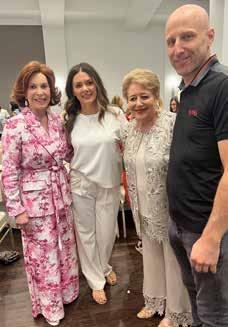

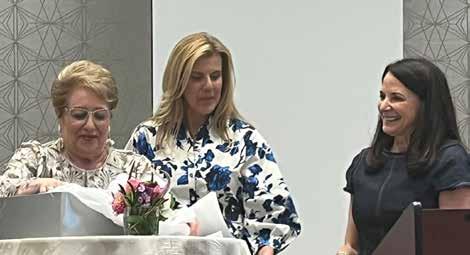
are where we want to be today. He mentioned a vendor technology expo with Israeli upstarts; and Georgia Tech exploring communication technology. He dazzled with futuristic talk of AI smart beds that could help with falls, UTIs, and the like. He also touted JHL’s low staff turnover rate.
Next, charismatic Rodney Leverette, head JHL Chef, with formal training and 30 years’ experience in the hospitality industry, shared how Habif mentored him in cuisine and keeping kosher.
He said, “We cook kosher and amazing food. I don’t get complaints because I don’t say ‘no,’ and give a lot of options. I can spend hours with Sherry and get great advice. She’s so creative, we make the food to match her room décor.”
Shari Bayer, JHL CMO, introduced
Habif, “Sherry shows up early, gives great advice, works all day, changes clothes, and attends the event, then stays to clean up. She’s a force!”
Habif approached the podium to accept a Frabel glass heart. She stated that her late husband was a “poster boy” for JHL food while in rehab. She explained how 18 (Chai) years ago she got involved, first starting with a Chanukah party, which led to Sweetheart’s Day where women came down in cocktail dresses. She thanked super volunteers Nancy Banks, Sylvia Friedman, and Shirley Rich. She recalled that then-President Cheryl Kramer convinced her to be president in 2011 to 2013.
She said, “We have the place for golden years, the last stop. They need sunshine and cheer. It is very enriching
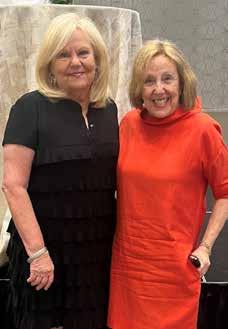

to see a smile on their faces.”
Thanking friends who traveled, Habif ended, “Keep me on speed dial to help.”
Susan Frumin (in from Miami) told the AJT, “Sherry has been a volunteer her whole life and never changed.”
Linda Rosh echoed, “Sherry even brought food trucks to Alabama for my family occasion.”
In from Louisville, Harriett Behr said, “I met Sherry in 1991 when she was trying on her wedding suit.”
Habif’s son, Adam, stated, “Mom’s passion in life is making others happy.”
Cheryl Schwartz closed the program by announcing the raffle winners for Botox injections, jewelry, wine, and tickets to see, “Beautiful,” with dinner at The Select. ì
By Robyn Spizman Gerson
A purposeful grant announced in 2024 is providing support for Winship Cancer Institute which received an Arthur M. Blank Family Foundation (AMBFF) Challenge Grant to assist an important collaboration between cancer researchers at Winship and in Israel.
Dr. Jonathon Cohen, co-director of Winship’s Lymphoma Program and professor of hematology and medical oncology at Emory University and leader of the collaboration, commented, “This grant by AMBFF matches 1:1 any funds that we raise in support of this program. We are using these funds to support an upcoming trip of eight Winship faculty members to visit three sites in Israel to discuss research and clinical collaborations. Additionally, the funds are being used to support training of Israeli physicians at Winship so that they can bring these skills back to Israel and improve care there. This type of initiative would not be feasible without support of these donations and the Blank Foundation.”
This innovative collaboration started as a series of emails with Dr. Cohen and Dr. Daniel Goldstein, a former Winship hematology/oncology fellow who is now an oncologist at Beilinson Hospital in Petakh Tikvah. Dr. Cohen explained, “Given the fantastic work being done in Israel, I envisioned a two-way international collaboration where researchers from both Atlanta and Israel could share expertise and best practices. In addition, given the Jewish Federation of Greater Atlanta’s partnership with the YokneamMegiddo region in northern Israel, I reached out to Emek Medical Center in nearby Afula. Both centers were eager to collaborate with us and our first trip in summer 2023 was a highly successful one. Since then, we have collaborated with clinical tumor boards, clinical and lab-based research activities, and Winship is currently hosting a fellow from Emek for training in leukemia and cellular therapies.”
This effort initially began in the summer of 2023, when Cohen went with three additional physicians, focused on hematologic cancers including lymphoma, leukemia, and myeloma. Since then, interest on both sides of the collaboration has increased, and while they couldn’t return last year due to the war, they now have eight Winship faculty members signed up, ranging in expertise from hematology to dermatologic oncology, and solid tumor oncology.

Cohen said, “I am also thrilled that we have both clinical researchers and lab-based researchers attending. For 2025, we have expanded the collaboration to now include a team at Ben Gurion University and Soroka Medical Center which will only serve to enhance the impact of the work we are doing. In light of all of the challenges faced by Israeli researchers in the past 18 months, it is even more important now to strengthen this bond and leverage the expertise of both sites to improve cancer care worldwide.”
He continued, “This is a critical time in cancer research. Many sources of funding are being limited and/or cut off from the NIH and other foundations, and this has had significant impacts on our ability to continue to move initiatives like this forward. The support from the Blank Foundation and our donors can maintain this pipeline of impactful work. In my experience in cancer research, these types of collaborations are always more fruitful and more impactful than anything we can do at one center and the likelihood of significant advances in cancer care in both countries because of this work is very high.”
Regarding Winship and Israel’s researchers working together, Dr. Cohen shared how this is a very natural collaboration in many ways. Much of the cellular therapy work that Winship is engaged in at present is based on technology that initiated in Israel. He added, “Israeli re-
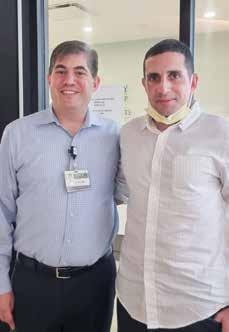
searchers are also at the forefront of investigating newer immunotherapies that have a high likelihood of impacting cancer care in the coming years. Winship’s expertise in cellular and immunotherapy and our experience in conducting large, highly impactful clinical trials across a variety of diseases pair nicely with much of the work being done there. Personally, I have met several Israeli colleagues who share my interest in investigating new therapies and improving outcomes for patients with lymphoma, and I look forward to building upon work that has been initiated since our first visit.”
Regarding this collaboration’s critical impact, it has become increasingly clear that cancer research requires a team approach if you are going to move the needle in a meaningful way, and anytime you can collaborate with smart, highly motivated colleagues, it benefits everyone. They are hoping that as this collaboration grows, there will be opportunities to compete for research grants, complete clinical trials of new therapies, and exchange trainees to make the most of the expertise available at both sites.
According to Cohen, Winship has also been working for some time to arrange to have an Israeli physician with interest in lymphoma and cell therapy spend time there. Winship welcomed the first Israeli fellow, Dr. Tamer Omari, this spring, and look forward to ongoing opportunities to host learners here in Atlanta.
Cohen added, “I view this as the beginning stages of a long-term collaboration that will benefit patients as well as researchers, trainees, and anyone impacted by cancer. Additionally, this is a fantastic way to highlight the major contributions that Israeli physicians and researchers can make on the care of patients with cancer. I feel this is particularly important in the current environment and I am steadfastly committed to ensuring that our colleagues at both sites are supported and can leverage their abilities and expertise to pursue critical work.”
With important matching grants like this one from the AMBFF, sharing research could impact the future of cancer and blood disorders. This meaningful alliance of experts is the key to ongoing innovation in the management of blood cancers and all cancers. Winship’s team of researchers here and in Israel are grateful and proud of this progress and aligned support. Dr. Cohen praises Israeli researchers who are at the forefront of technological advances and believe this vital research working together will help impact advancements in the treatment of cancer.
For more information on how you may make a gift to support this work, please contact Jennifer Morton in Winship Cancer Institute’s development office at 404-310-8942 or jennifer.morton@ emory.edu. ì
By Bob Bahr
The new 19-story Arthur M. Blank Children’s Hospital which towers over its 26-acre campus on North Druid Hills Road is being joined by a new facility that could help to save countless young lives and reshape the future of modern medicine.
The new Marcus Center for Cellular Medicine at the hospital is funded by the Marcus Foundation, whose founder, Bernie Marcus, was an early and prominent advocate of cellular medicine. It is a rapidly developing technology that often uses the body’s own cells to promote healing.
For children suffering from leukemia, cancer of the blood, which was often fatal in the past, cellular therapy can be an effective treatment in many cases. Dr. Douglas Graham, who heads up the cancer and blood disease program at Children’s Healthcare of Atlanta, has seen a dramatic impact on survival rates over the past 50 years.
“When we think of the impact cellular therapy has had in such devastating diseases such as pediatric leukemia,” Graham points out, “there has been a paradigm shift, really, in how we treat children with relapsed leukemia and high-risk leukemia. We have effective therapy for about 80 percent of the kids with pediatric leukemia.”
For Dr. Jonathan Simons, chief science officer and medical director of the Marcus Foundation, cellular therapies can help redefine the meaning of drug treatments.
“This is life-extending, lifesaving, and life-changing material. It’s not like making a drug like penicillin or Tylenol. This is not like a little blister pack of pills. This is a whole new frontier for pharmacology and the pharmaceutical industry.”
According to Dr. Graham, living cells can also be used to repair or replace tissues that have been damaged. There are trials currently at the hospital to use cellular therapy as an aid for children born with certain forms of genetic heart damage or to repair cartilage and other tissue damaged by osteoarthritis.
In the treatment of children who have leukemia that has resisted other treatments, physicians at Children’s Healthcare are able to take white blood cells from a young patient’s body and train these cells in a laboratory to seek out, identify and kill leukemia cells. These cells, called thymocytes or T-cells, are then infused back into the patient to help rid them of cancer.

“It’s only been in in the last decade,” Graham notes, “that we’ve understood how we can train these cells, by injecting instructions into the cell that help them identify, specifically identify, the cancer cells and not the normal cells, and to be able to kill those that are causing the disease.”
But progress like this doesn’t come cheap. For drugs, like Lyfgenia, that are used in the often-fatal disease of sickle cell anemia, the treatments can cost more than $3 million each. A similar drug, Casgevy, can cost $2.2 million or more.
But this innovative cellular treatment center at the new children’s hospital is described as a Center of Excellence that could provide the expertise and resources to develop highly specialized treatments at a much lower cost. The Marcus Center is one of the few such places in the country that are developing cellular treatments for more than cancer.
Bernie Marcus, through his foundation, is considered by many to be one of the first philanthropists to recognize the potential of cellular treatments. The Marcus Foundation has supported research at Duke University, UCLA Medical Center, and M.D. Anderson Cancer Center in Houston.
Recently, the foundation donated $20 million to Georgia Tech’s Marcus Center of Excellence for Cell Biomanufacturing to explore ways of bringing down the cost of treatments from the millions of dollars to just a few thousand dollars.
According to the National Institutes of Health, cellular therapies have the potential to save 21 million lives annually. Research is taking place today that might someday lead to human skin being grown in a laboratory. It may mean that burn victims could be nursed back to health without scarring and those with spinal injuries might be able to

walk again. Organs like kidneys and livers might even be grown in a laboratory, someday, experts say, maybe even without a human donor being involved.
Dr. Simons is assured that all this is not science fiction. The foundation is stepping up its funding in the field and expects to award a new series of grants this summer.
While Bernie Marcus has passed on, Simons believes that the same foresight that helped bring The Home Depot corporation into existence can help to revolutionize medical care.
“Bernie saw around corners, and he saw miles ahead, but then there’s the work to do right in front of you, and that’s what we’re doing.” ì

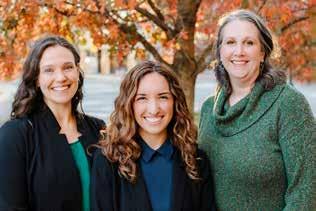

By Bob Bahr
Eighty years ago, this month, when the Second World War ended in Europe, the world was finally able to add up the cost Jews paid during the deadliest war in history. But as a recent program of the Atlanta Jewish Film Festival (AJFF) points out, we are still adding up the price that Europe’s Jews paid in so many other ways during those years.
In the AJFF online presentation, “Stolen Masterpieces - The Lasting Toll of Nazi Plunder,” the festival examined how the Nazi occupation of much of Europe led to art thievery on a grand scale. How, in the words of Stuart Eizenstat, who was part of the AJFF discussion, the plunder of artistic masterpieces owned by European Jews was as highly organized as the Nazi campaign of extermination against those same people.
“The Nazis intended not only to kill Jews individually and collectively, but to destroy every aspect of Jewish civilization and Jewish life,” Eizenstat said. “Remarkably, during the war, they stole up to 600,000 paintings. And this is unmatched anytime in world history. And they did so with the same efficiency and scale as the Holocaust itself.”
Many of these valuable paintings and other important art treasures were never recovered. Countless others disappeared into the murky world of private sales, facilitated by art dealers and others who had a hand in the plunder of Jewishowned art and the murder of Jewish art collectors.
In one of the outstanding documentaries screened at the Festival earlier this year, the career of one of these notorious figures was re-examined. “Plunderer: The

Bruno Lohse (right) plundered the art collections of Jews during the Holocaust for Hermann
Life and Times of a Nazi Art Thief” recounted the life of Bruno Lohse, a former German SS officer and personal agent in Paris for Hermann Göring, who was second only to Adolf Hitler in the Nazi hierarchy. The film is based on Jonathan Petropoulos’s 2022 biography of Lohse.
Lohse was a master at covering his blood-stained tracks over the years. He used pliable middlemen, avaricious Swiss banks, and a shadowy foundation in Lichtenstein to facilitate sales to some of the biggest galleries and museums in the world.
This tale of greed and thievery, according to the film, even extended into the lofty world of New York’s Metropolitan Museum of Art. Lohse cultivated a friendship with none other than Theodore Rousseau, who was an important curator of the museum. Ironically, he had been a highly decorated member of the Monuments Men, that band of U.S. agents who worked tirelessly after World War II to return artistic masterpieces to







their prewar owners.
The questionable contacts Rousseau had with Lohse highlights the difficulty that has developed around the question of how to deal with Nazi stolen art. The explosive growth of art museums in the U.S. after World War II, the tax laws that favored wealthy American collectors, and the dramatic rise in art prices over the last 80 years has helped fuel the trade in solen art that exists to this very day.
Lohse’s career flourished over the years, and he retained a large collection of artistic masterpieces when he died in 2007 at the age of 95.
The prosperous career of this Nazi criminal continued with few interruptions, as the documentary and the AJFF program pointed out, because of the vast sums of money the art trade generates internationally.
Global art sales, according to one Swiss bank that tracks them, totaled more than 40 million transactions last year, worth nearly $59 billion.
Collectors and museums spending all that money for great art aren’t eager to return it to the heirs of Jewish collectors who saw their collections snapped up by Nazi
agents like Lohse.
Robert Edsel, whose book on the work of The Monuments Men was made into an Academy Award winner in 2014 for George Clooney, told the AJFF online audience how difficult it is to repatriate these works.
“I’ve spoken to a collector who had a billion-dollar art collection in their home. And the person’s response was, are you telling me I would have to take this Monet water lilies off the wall and give it back to someone? And I said, yes, if it was looted. And the response was like that immortal quote of Charlton Heston’s, about prying the prying the gun out of my dead hand.”
Still, progress is being made, even after all these years. Eizenstat has worked tirelessly over the years to create and help implement The Washington Principles, a system of international agreements that have helped to return art that was looted by the Nazi and others.
In recent years, the Metropolitan Museum of Art has appointed a curator to examine the 1.5 million items in its collection to determine which may have been tainted by the crimes of the Holocaust. ì
By Bob Bahr
When David Abes was growing up, much of what is now the city of Dunwoody was still farmland. He and his friends would bicycle over to what is the presentday Dunwoody Village shopping center that fronts on to Roberts and Mt. Vernon Roads. On the corner where the two streets intersect, the two-story old Dunwoody Farmhouse stood and remains as a focal point of the community.
But despite its history, he felt that the prosperous suburb that became a city of 55,000 in 2008 needed a greater sense of community. The sprawling Perimeter Mall on the south side of the city is too commercial to be a real center to gather in, and other, smaller clusters of shops, service establishments and restaurants didn’t have much interest in being more than real estate properties.
Over the last several years, Abes’ goal of creating community in suburban Atlanta has resulted in a complex of four closely grouped operations he’s created that nestled on his old playground, now the Dunwoody Village shopping center.
“What I really wanted to create was not just restaurants. I wanted it to be a place where people could gather. And that’s really where we came up with the different concepts that we have grouped together in Dunwoody, around an open courtyard with an outdoor projection screen and an elevated stage.”
But no restaurants or even group of them can bring old and young together, particularly during an Atlanta summer, more than a cold ice cream cone on a hot day. So, to top off his community of restaurants, Abes has just opened a spacious ice cream parlor that fronts the complex. It is a redesigned and expanded successor to a Bruster’s that was once there.
He’s stocked what he calls his Good Vibes ice cream shop with a rotating selection of 18 different flavors. He can also build you a towering ice cream sundae or make you a thick shake or add a scoop to his gourmet brownies.
Abes’ ice cream supplier, a Michigan dairy, was chosen as the finalist after he and his family carefully sampled two dozen creameries around the country. Julie, his wife, redesigned the place and expanded it to give it a brighter retro feel.
Along one wall there’s a bank of free video arcade games. Another large space is for birthday parties and other family celebrations. A covered patio out front has tables and chairs to just sit and schmooze with a cool cone. And the ice cream is ko-


sher.
That’s particularly important to Abes who is mindful of the significance of Dunwoody’s Jewish community. It includes The Davis Academy, one of the largest Reform day schools in the country, Temple EmanuEl, Congregation Ariel, Jewish HomeLife’s Berman Commons assisted living building, and the sprawling Marcus Jewish Community Center of Atlanta with its large athletic grounds.
One of his restaurants, Morty’s Meats, had a take-out catering menu for Passover, which did big business this year selling brisket and barbeque salmon. His motherin-law made the chopped liver they sold.
In some ways, his ice cream spot and the three restaurants that it joins in Abes’ development in Dunwoody resemble the food operations at The Works on the Westside or the recently redesigned Colony Square complex. The idea behind each is the recognition that eating out has become a much more informal occasion, with the opportunity to meet and mingle while enjoying an enhanced variety of food options.
“I like when you cluster restaurants together,” Abes comments, “because the guests aren’t always going to go to the same restaurant every night. But what I like about our complex is they can spend a whole night here. They could start at our tavern and have some charcuterie and a drink. They can go to our seafood restaurant, Message in a Bottle, then have a night cap at one of the other restaurants.”
Socializing with a wide variety of food and drink options was the feature of Abes’ Green Eggs and Kegs Festival that blossomed on the parking lot last month outside his restaurant complex, just beyond his new ice cream parlor.
A crowd of nearly 2,500 filled a large
tent on the lot and spilled out into the courtyard, where a band played for dancing. For five hours, a $75 ticket provided an endless buffet of food from 30 caterers and area restaurants and drinks to wash it down from 50 wine, beer and other beverage companies. The event raised $10,000
for Breakthrough TiD, a diabetes research and advocacy organization that Abes supports.
“It's just one more reason, if you needed it” Abes says, “why we think that you don’t have to leave Dunwoody to come to ‘Funwoody.’ We’re always here.” ì




By Marcia Caller Jaffe
As Vatican City clamored over who and when to billow out the white smoke, Ahavath Achim (AA) selected Rabbi Eric Feld to join the congregation as Associate Rabbi and Director of Lifelong Learning.
Congregants Sarah Cohen and Randy Weinstein were charged to head a clergy search committee to recruit a new assistant rabbi by late spring. The pool was narrowed to the three candidates, all of whom were asked to participate in religious services. Congregants were then queried to submit feedback online.
Rabbi Feld was chosen to assume the post July 1, 2025. Feld will vacate his current position as Assistant Rabbi and Educational Director of Congregation Beth Shalom in Dunwoody. Feld, a native of Knoxville, Tenn., grew up in the South and has fond memories of visiting AA as a youth and “feeling a sense of awe.”
He stated, “In many ways, I have always felt connected to the AA given its early support for Ramah Darom and Etgar 36, both of which were formative experiences in my own Jewish journey. To






now return and join this extraordinary and historic kehillah as Associate Rabbi and Director of Lifelong Learning feels like coming full circle — and it fills me with tremendous excitement and gratitude.”
The search committee also consisted of Larry Gold, Nancy Levine, Rachel Joseph, Eric Miller, and Brandon Goldberg in addition to Cohen and Weinstein. They also formed a consultants committee to help vet, interview, and work with the committee and candidates alongside coordination with The United Synagogue of Conservative Judaism (USCJ) and The Rabbinical Assembly.
Weinstein said, “It’s clear that each prospective rabbi possessed the ability to make a lasting positive impact on our community. In seeking the specific blend of qualities best suited for our future, we found that Rabbi Feld brings a compelling combination of charisma, knowledge, passion for Jewish education, and a remarkable ability to connect with congregants of all ages. We are excited to welcome Rabbi Feld to the Ahavath Achim family this summer.”




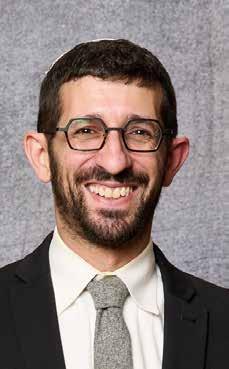
Often seen huddling at the Saturday kiddish, Weinstein and Cohen found no shortage of congregants who wanted to “have their opinions heard.”
AA Senior Rabbi Laurence Rosenthal admired many of Rabbi Feld’s talents. “Eric brings many wonderful qualities to our community: a love of Torah and tradition, deep Torah learning, joy in practicing Jewish ritual, and more. However, his greatest quality addressed an almost impossible challenge I gave to the search committee — to find somebody who already loves the Ahavath Achim community.”
The request to Rosenthal seemed paradoxical when most candidates were meeting and learning about the commu-
nity for the first time. Yet Rabbi Feld’s upbringing in Knoxville, in a small but vibrant Conservative congregation, afforded him the opportunity to participate in regional United Synagogue Youth, which held conferences and conventions at AA.
Rosenthal concluded, “This experience gave him a deep love for our community — the number one quality we seek in clergy, staff, leadership, and congregants.”
AA President Mark Stern welcomed Rabbi Feld to the congregation by telling the AJT, “From the moment we met, it was clear to me that he brings not only a strong foundation in Jewish learning and pastoral care, but also a genuine passion for working with young families. His experience in preschool education will be an incredible asset as we nurture the next generation of Jewish life in our community.”
Rabbi Feld received his ordination from Hebrew College Rabbinical School in Boston. In July 2023, he assumed the position of Beth Shalom Assistant Rabbi and Director of Lifelong Learning. Previously, he served as the Assistant Director of the Genesis summer program at Brandeis University, the Hillel Director at Boston College, and the Rabbinic Intern with the Hillel Council of New England and with Hebrew College. Prior to rabbinical school, he was a town planner in Chapel Hill, N.C., and remains an avid Tar Heels fan.
Rabbi Feld and his wife, Ashley, will move from Dunwoody to Buckhead with their three young children. Ashley Feld is Director of Evaluation and Quality Assurance at Jewish Family & Career Services. ì
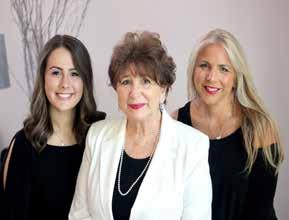

By Marcia Caller Jaffe
Sparkling gold zahav kippahs corresponding to Jerusalem, the “City of Gold,” were the starting points of the 50th anniversary Gala of Congregation Etz Chaim on April 27 with a sold-out capacity crowd. Past presidents, board members and congregants gathered in the synagogue’s social hall, library, and outdoor patio before the formal program began.
Senior Rabbi Daniel Dorsch told the AJT, “It’s hard to attend a gathering like this one and not walk away feeling inspired. I am truly grateful to our members, volunteers, and professional staff past and present, who contributed toward building Etz Chaim. It is a singular privilege to serve as its rabbi. Our future is assuredly bright as we travel full speed ahead into our next 50 years.”
Event chair (along with Barney Epstein) and past President Bob Bacharach echoed, “Fifty years has flown by. I was here for 38 of them -- some as COO, nine years as executive director, and seen the congregation mature and bloom with a $4.5 million renovation.”
The program began when Assistant Rabbi Jonathon Adler made the Hamotzi with 96-year-old Lou Rosengarten. Adler, who had recently been featured in the AJT for his mitzvah of a kidney transplant, said, “I am thankful to be here and so grateful for those who worked for the past 50 years to build this community.”
Past President Jamie Platt-Lyons, serving as emcee, noted the congregation’s growth to almost 600 families, reflecting back to Etz Chaim’s inception in 1975 with just six families. Rabbi Dorsch addressed the zahav “golden” theme: “What makes something golden refers to the root ‘zev,’ which means ‘gift.’” He explained that 50 years ago the property was farmland and a two-lane road; and pine straw was being sold just down the street. He concluded, “Your sense of belief and giving makes us ‘golden.’”
Platt-Lyons next introduced Rabbi Emeritus Shalom Lewis who started as a student rabbi in 1978. Lewis then rattled off an impressive -- almost unlimited -series of Etz Chaim’s milestones: Men’s Club, events with churches, drive-thru Sukkahs, gift shop, ganza, world-class scholar visits, softball teams, ruach singers, retreats, senior programming, Gay Pride Shabbat, confronting a KKK rally, buying a house, buying a church, buying a ball field, and with only two senior rabbis in 50 years.”
Next up was former president and

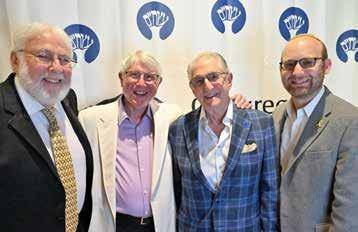


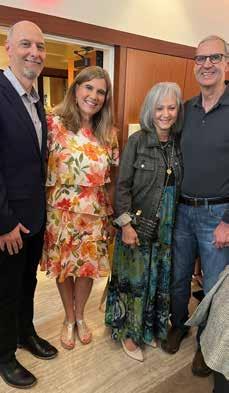
retired pediatrician Stephen King who spoke about the fragmentation of groups when he led the first joint service in the community room at Parkaire Mall, and the hotbed of antisemitism that they faced from 1975 to 1978. He thanked Marty Gilbert for working through the “years of blood, sweat and tears,” and ended, “G-d said, ‘It was good.’”
Past President Elliott Okrent looks forward to the next 50 years and acknowledged congregant Sam Olens for facilitating the celebration proclamation by Gov. Brian Kemp. He had all past and present volunteers and board members raise their hands to illustrate the involvement of so many.
On April 25, The Marietta Daily Journal featured the congregation’s halfcentury mark in an article, “Planting for My Children: Cobb’s First Synagogue Celebrates 50 Years.”
The band played a rousing hora and other dance tunes while rabbis and various execs were tossed up in the traditional chair lifting. Debbie Deutsch, religious school director, was thanked for her years of service.
Benefactor Dr. Raimie Tritt told the AJT, “I’m super excited to have been a longtime member and seen the congregation grow from a small to a vibrant community, now the East Cobb, Marietta synagogue.”
Past President Judy Fineman praised
the continued growth and camaraderie, which is really what the spirit of Etz Chaim is all about. She stated, “As President, I wanted to be sure to welcome new members and help everyone continue to be mensches.”
Former trustee Bonnie Silverman noted that the Etz Chaim library was named for her late son. Past President Linda Pollack summed it up, “Here it feels like home.”
Tropic Catering featured a Mexican station outside, Italian cuisine in the library, and sushi and Asian delights in the social hall. After dessert, the silent auction closed for some happy bidders and winners. ì


Robotics Team Forfeits Title Bid over Shabbat Observance
An Israeli youth robotics team withdrew from the final round of an elite ro-
May 15, 1967: Naomi Shemer’s “Jerusalem of Gold” is one of five Jerusalem-themed songs unveiled at the Voice of Israel Song Festival. The song is an instant hit. Shemer adds a stanza after Israel unites Jerusalem the next month.

The original map included with the Sykes-Picot Agreement assigns Area A to France and Area B to Britain, with the yellow area to be an international zone.
May 16, 1916: Diplomats Mark Sykes of the United Kingdom and Charles Georges Picot of France complete the Sykes-Picot Agreement, a plan to divide the Ottoman territories in the Middle East between their countries after World War I.
May 17, 1939: A British government White Paper institutes extreme restrictions on Jewish immigration and land purchases in Palestine, signaling the British willingness to relegate Jews to permanent minority status in an Arab-led state.
May 18, 1973: Poet and translator Avraham Shlonsky, whose innovative use of language helped develop modern Hebrew, dies in Tel Aviv at 73. He worked as a road builder in the Land of Israel until he succeeded with his writing.
May 19, 1966: President Lyndon Johnson’s administration announces the first U.S. sale of warplanes to Israel. Israel eventually buys 217 A-4 Skyhawk light bombers, which enter service as the Ayit (Eagle) in 1968.
botics championships recently in Texas due to their religious observance of Shabbat, which precludes the use of electronics, among other things.
The forfeit marked the second time in three years that the Trigon 5990 team from AMIT High School for Boys in Modiin withdrew from the FIRST (For Inspiration and Recognition of Science and Technology) robotics competition due to the final being held on Saturday.
After announcing their withdrawal, the group set up a booth outside the competition with a table containing an Israeli flag, a Kiddush cup and challah, along with a sign reading, “Why aren’t we here today? Because today is Shabbat!” The sign contained a QR code referring those interested to a link where they could learn more about the Jewish day of rest.
Compiled by AJT Staff

May 20, 2011: Arieh Handler, who witnessed Israel’s Declaration of Independence, dies in Jerusalem at 95. He helped bring the Bnei Akiva youth movement to Britain and made aliyah in 1948 and again in 2006.
May 21, 1963: Former Knesset member Zalman Shazar is elected Israel’s third president, succeeding Yitzhak Ben-Zvi, who died. Shazar was a writer of the Declaration of Independence and Israel’s first education minister.
May 22, 1970: Popular Front for the Liberation of Palestine terrorists kill eight children and four adults in an attack on an Israeli school bus about 500 yards from the Lebanese border. More than 20 others are wounded.
May 23, 1420: Inspired by antisemitic religious fanaticism, Archduke Albert V issues the Wiener Gesera (Viennese Decree), ordering all Austrian Jews to be imprisoned and their possessions to be confiscated.
May 24, 1895: Marcel Janco, a major influence on modern Israeli art, is born in Romania. A multimedia artist, he moves to Zurich during World War I and helps launch the Dada movement with costumes, sets and masks.

Virgin, Turkish Airlines, and Pegasus Airlines have signaled they will not resume flight services to Israel amid ongoing Gaza war. UK carrier Virgin Atlantic last week permanently ceased direct flight services between London and Tel
May 25, 1991: With a brief window of permission, Operation Solomon in 36 hours flies more than 14,000 Ethiopian Jews to Israel, almost twice as many Beta Israel as during Operations Moses and Joshua combined.

May 26, 1958: Gunfire from the Jordanian side of the demilitarized zone on Mount Scopus in Jerusalem kills four Israeli police officers and the Canadian officer who chairs the U.N. Israel-Jordan Mixed Armistice Commission.
May 27, 1973: Chaim-David Halevi, who in 1964 became the youngest member of Israel’s Chief Rabbinate Council, is elected the Sephardi chief rabbi of Tel Aviv-Jaffa over five others and succeeds Ovadia Yosef.
May 28, 1964: A 400-delegate Palestinian National Council convened by King Hussein of Jordan in Jerusalem’s Old City establishes the Palestine Liberation Organization. Ahmad Shuqayri is elected the chairman.
Aviv, after pausing the operation of the route, due to the 18-month war with the Hamas terror group.
In a bigger blow to the country’s travel industry, Turkey’s airlines decided to forego their time slots for takeoffs and landings at Tel Aviv’s Ben Gurion Airport, indicating that they will also not resume their flight services to Israel.
Richard Branson’s Virgin was expected to resume its flight services to Tel Aviv from London Heathrow around November, after halting the service due to the outbreak of the war against Hamas in Gaza with the Oct. 7, 2023, onslaught.
All direct flights between Israel and Turkey, operated by Turkish Airlines and low-cost carrier Pegasus Airlines, were canceled shortly after Hamas invaded southern Israel to kill some 1,200 people and abduct 251 hostages.
Compiled by AJT Staff
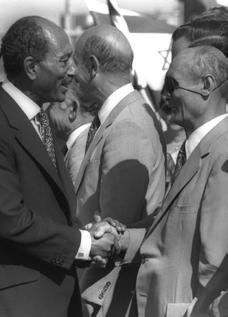
May 29, 1979: Foreign Minister Moshe Dayan speaks to the Knesset about the events that culminated in the Israeli-Egyptian peace treaty. He expresses optimism that normalization between the countries will succeed.
May 30, 1972: Hired by the Popular Front for the Liberation of Palestine, three Japanese Red Army terrorists with machine guns and grenades kill 26 people at the Lod airport. Eight of the victims are Israelis.
Items are provided by the Center for Israel Education (israeled.org), where you can find more details.



Dave Schechter From Where I Sit
I have heard the following from Jewish friends in recent months: There is so much happening in this country, I just don’t have the bandwidth to invest in Israel. I get that. There is much of critical importance happening at home. I nonetheless was surprised when a friend told me that he was losing interest in Israel, so great was his frustration over the war in Gaza, the hostage ordeal, and other issues.
These conversations came to mind on April 29 as I stood in the back of the sanctuary at the Ahavath Achim Synagogue, my preferred vantage point at the annual Yom HaZikaron ceremony.
The day of remembrance recognizes Israel’s fallen military, who number 15,420 over the nation’s 77 years, and 4,229 victims of terrorism in Israel and abroad.
As the event began, an American friend active in organizations that support Israel told me that, when he arrived, an Israeli acquaintance thanked him for coming.
The American asked why he was being thanked. Because the community — meaning the larger Jewish community — doesn’t attend, the Israeli answered.
“Disgusting” was the adjective my American friend used to describe the situation. He suggested later that maybe he had been too harsh. “It just makes me sad,” he said.
I have written before about the indifference shown this event, despite Yom HaZikaron being “the most sacred day in the Israeli calendar,» as Anat SultanDadon, Israel’s Consul General to the Southeastern United States, called it in her remarks. Most of the 1,000-plus in the audience wore white shirts or blouses, as a sign of mourning and respect.
Rabbi Peter Berg, Senior Rabbi of The Temple, told the gathering, “Today all of us are one family, united in grief and love.”
Gary Sobel, a national board member of Friends of the Israel Defense Forces, said, “Your pain is our pain. Your loss is our loss.”
Not to quibble with Berg or Sobel, but one side of the family seems less concerned.
To be fair, there were rabbis, leaders of communal organizations, and elected officials in attendance, some participating
in readings and the laying of memorial wreaths. But there were relatively few from what might be called the rank-and-file Jewish community.
From conversations in past years, I know how this rankles the Israeli community, for whom Yom HaZirkaron is at least as (if not more) important than Yom Ha’atzmaut, Israel’s Independence Day, which follows the day after.
Atlanta’s Jewish community is hardly shy about expressing itself on various issues and will turn out in large numbers to support Israel in a crisis, as it did after the Oct. 7, 2023, terror attacks on kibbutzim, towns, and an outdoor music festival, in which 1,200 men, women, and children were killed and another 250 kidnapped. Yom HaZikaron this year fell on day No. 571 since Oct. 7.
As this column was filed on May 12 — day No. 584 — Hamas freed 21-year-old Edan Alexander, a New Jersey native and the last living hostage also holding U.S citizenship. Alexander, who made Aliyah at age 18, was kidnapped when his IDF unit’s base near Gaza was attacked on Oct. 7. Hamas still holds the bodies of four other murdered U.S. citizens, three men and a woman.
Alexander’s release brought the total number of remaining hostages to 58, with 35 believed to be dead, 20 believed to be alive, and the status of three others “in doubt,” according to Israeli Prime Minister Benjamin Netanyahu.
The anxiety felt by the hostages’ families has been heightened by reports from Israeli journalists that return of the hostages was put at the bottom of the priority list in orders given to military commanders in advance of what Netanyahu has outlooked as an upcoming “forceful operation” in Gaza.
As I do every year, as the Yom HaZikaron ceremony at Ahavath Achim ended and the audience filed out, I positioned myself at the sanctuary’s center doors, listening to the language they spoke. What I heard was almost entirely Hebrew, with a smattering of English.
“It’s a sign of the chasm,” a young man familiar with the Israeli community told me.
The same chasm existed when I wrote after the May 2024 ceremony: “Looking to next year, those in the larger Jewish community who profess to support Israel can recognize the importance of the Yom HaZikaron ceremony for the local Israeli community by turning out in greater numbers.”
That didn’t happen. ì
In recognition of the Atlanta Jewish Times celebrating its 100th year from its first edition in 1925, the AJT will re-publish articles from the Southern Israelite from editions dating as far back as 1929, the earliest edition available through the Digital Library of Georgia. All of the Southern Israelite editions, from 1929-1986, can be viewed at gahistoricnewspapers.galileo.usg.edu/lccn/sn78003973/
Please enjoy this retrospective of Jewish journalism in Atlanta and across Georgia, and thank you for supporting the Atlanta Jewish Times for the last 100 years.

The AJT welcomes your letters. If you would like your letter to be published, please write 200 words or less, include your name, phone number and email, and send it to kaylene@atljewishtimes.com.
Dear Friends and Family,
Disclamer to our readers:
This section of the newspaper is a forum for our community to share thoughts, concerns and opinions as open letters to the community or directly to the newspaper. As a letter to the editor, we proof for spelling and grammatical errors only. We do not edit nor vet the information the letter contains. The individual signing the letter is accountable for what they share.
Unfortunately, because of unusual circumstances and the continuing war, I have faced quite a bit of the sadness of death most frequently. Here are some quotes which I have found - they target life.A religious sect decided its motto would contain these words, “millions now living will never die.”
Look at this reply to the words - “yes, but the tragedy is that millions now living are already dead.”
We know what the medical definition of death is. But what is the status of the human being when the soul shrivels and the spirit withers?
The longest life ends too soon - a faint tick on the clock of eternity. And yet, WE have enough time to make a difference in so many ways. We can determine how we use each day, all the more precious for what it becomes for us.
For all its brevity, LIFE is long enough to find fulfillment to matter, to choose a path. The number of our days may be beyond our control, but their quality and texture depend on us.
Time moves steadily ahead. Like manna, in the Bible, it cannot be hoarded. Nor can it be reversed. The film of life cannot be rewound. Nor can life be halted in its flight.
A famous philosopher asked, “What can we do with time?” We can kill it, we can waste it, we can use it, we can invest it, prisoners serve time, musicians mark time, idlers pass time, speeding motorists make time, referees call time, historians record time, scorekeepers keep time!
Remember well - the only time we have - our 24 hours of 60 minutes each day.
Whatever time takes - it leaves something behind.
In place of loved ones - time leaves undying and enduring lessons. The BLOOM time stole - it replaced with lines gently etched in the bright moments of shared laughter and somber moments of chastening sorrow.
If we can no longer run as quickly as we did yesterday - we can stand today with great poise.
While TIME was stealing the smoothness from our skins, IT was giving us the opportunity to remove the wrinkles from our souls.
YOUR TIME IS YOURS USE IT WELL.
Rabbi David Geffen, Jerusalem, Israel


David Ostrowsky
Allison
Mercer’s inspiration for running hundreds of miles a year — often in the punishing Georgia heat along rocky trails, no less — may startle some. Running, after all, is a most rigorous, painful, at times monotonous sport that constantly tests the willpower and patience of its most dedicated practitioners. But Mercer, a lifelong Atlanta native and alum of Woodward Academy, who continues to compete in marathons and even much longer events all around the world, maintains that running, above all else, is a pleasant diversion from everything else going on in life.
“I just like running. I’m just happy to run. A lot of people need a race or some kind of incentive,” said Mercer, who is unmistakably an elite race runner, having recently represented Team USA in the 100K World Championships in India, during which she helped the U.S. secure a bronze medal by finishing third in the entire field of women over 40.
A late bloomer in every sense of the term, Mercer participated in cross-country and track and field at Woodward but never posted such awe-inspiring running times to catch the attention of college coaches. Ironically, she would matriculate at the University of Pennsylvania, host of the venerable Penn Relays, but the closest she ever got to competing at Franklin Field was partaking in ultimate Frisbee matches. However, when she wasn’t playing organized Frisbee, Mercer kept running on her own time during her undergrad years at Penn, remembering how much the sport had given her during high school.
“Running was fun,” she reiterated. “It was tough in the summertime because of the Atlanta heat, but I always enjoyed it. It was just great to go to different campuses and compete.”
After graduating Penn in 2005 and joining TNT Sports where she worked as a production assistant, statistician, and field producer, Mercer stayed active by running recreationally (there were multiple times when she would go on distance runs with one of her colleagues, NBA Hall of Famer Reggie Miller, when they were on the road) but her travel-intensive, unconventional work schedule,
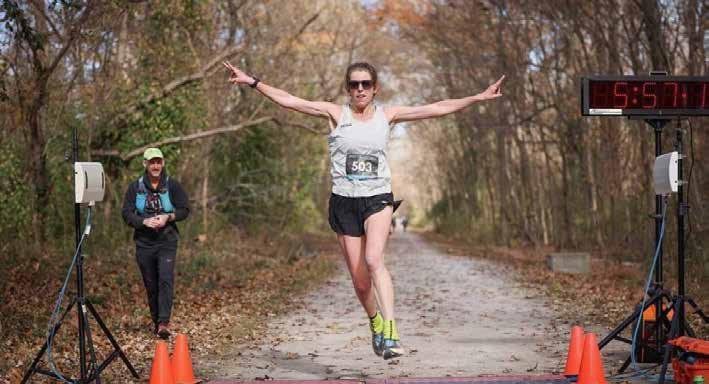
which frequently involved nights and weekends, made it difficult to adhere to a strict running regimen and work towards constantly shaving minutes off her personal records (PRs). Yet, in 2017, when she transitioned to a new job handling regional logistics for Amazon, the new “9-5” schedule enabled Mercer to meet up with friends for group runs and even try her hand at marathons.
Now in her early forties, while working full-time for Amazon, Mercer, who has run so many marathons that she has literally lost count, is posting logicdefying times that are considerably faster than those which she recorded at Woodward. During her most recent race, the Athens Twilight 5K, Mercer, 42, finished first in her age group with a 17:40 mark, which equated to a 5:41 mile pace — six minutes faster than her personal best time in high school and well ahead of the times set by runners half her age. Two weeks earlier, during a blustery afternoon in Madison, Wisc., Mercer polished off the 50K MadCity Ultras in a tidy 3:24:29. Merely 15 runners — irrespective of age and gender identity — finished ahead of her. Mercer’s crowning achievement as a runner that catapulted her to the U.S. national team came during the 2023 Tunnel Hill 100 when she completed the 50-mile race under six hours to set a U.S. record for women over 40.
“It [running] has created so many op-
portunities that if you told Allison in high school, ‘Hey, you are going to be wearing the USA across your chest, representing your country, and also be setting these times and doing these paces,’ I would have just been like, there’s no way,” confessed Mercer, who is actively engaged in the Atlanta Jewish community through volunteering for the Jewish Federation of Greater Atlanta and Jewish Family & Career Services, and dedicates herself to the Atlanta Track Club and Atlanta Trail Sisters, a group that empowers women to feel comfortable running on trails.
One of the opportunities that Mercer’s running career has afforded her was meeting her husband, Ben, a very talented runner in his own right, in 2019. To this day, Allison credits him for not only encouraging trail running as part of her routine — the couple has blazed through the 58-mile-long Georgia Loop that snakes through the Chattahoochee National Forest at a vertical gain of 15,000 feet and the entire Georgia section of the Appalachian Trail, which spans more than 80 miles — but also discouraging her from putting forth max effort in workouts for the sake of social media promotion. “He [husband] really instilled in me [the importance of] keeping the easy days easy,” acknowledged Mercer.
Aside from Ben, if there’s anyone else Mercer credits for supporting her running endeavors it’s her manager at
Amazon, who’s no stranger to pounding the pavement herself.
“You make it work. It’s nice to have a schedule where you can see what calls you have and plan around it,” she added. “My boss is also a runner, so it helps that she understands the demands. If I’m going to a race, I just give her a heads up. She approves the time off and just asks to send a tracking link so she can follow along as well. It’s just nice to have that balance.”
Between battling the inhospitable, jagged terrain of the Georgian hills and the region’s often sultry weather, “I mean, you just adjust. As long as you can anticipate it and you’re used to it. It’s just perspective. It helps prepare you for everything.”
Mercer has positioned herself well for enjoying a sustainable run as a worldclass runner. Perhaps more importantly, she has thus far steered clear of muscle tears and shin splints that derail many runners’ careers and feels poised to land atop the leaderboard at the Peachtree Road Race in a couple months.
On a grander scale, looking a few years down the road is, of course, the 2028 Summer Olympics in Los Angeles. How would she feel about donning the stars and stripes during the first Summer Olympics on American soil since the 1996 Games in Atlanta?
“I’ll see how the marathon qualifier is. I mean, it being in L.A., why not?” ì
By David Ostrowsky
As a nod to its burgeoning athletic program, buttressed by recent enhancements to the Eitan Force Athletic Complex, The Weber School hosted its inaugural golf invitational at the Dunwoody Country Club on Monday, April 28.
With more than 100 golfers, including nine Weber alumni participating, and the support of dozens of sponsors, the first run of The Weber School Golf Invitational was a smashing success, raising significant funds to bolster the athletic department’s efforts to recruit and retain top-tier coaches, trainers, and other athletic professionals for the student body.
“The event itself was as spectacular as the weather, which was absolutely beautiful,” shared Weber Associate Head of School/Chief Advancement Officer Paul Ginburg, who spent the better part of the past year planning the invitational, when speaking to the AJT. “It was a nice way to have different parts of our community be part of a Weber event. Everyone had an amazing time.”
The invitational, which sold out individual playing spots and foursomes prior to event day, was played in honor of two-time President of the Weber Board of Trustees Michael Karlin, whose three children have all graduated from Weber.
“Many people both within the Weber community the Atlanta Jewish community and outside the Jewish community recognized Michael for his achievements here at the school and within the community,” added Ginburg. “They turned out in droves to support him and the school. It takes a tremendous honoree to draw attention, which we had in Michael.”
In addition to the nine alumni who attended (Joseph Brickman, Daniel Ginburg, Josh Kalish, Benjamin Karlin, Jared Kaye, Benjamin Rosenberg, Justin Silver, Jaron Solomon, Josh Videlefsky), the invitational also prominently featured Gavin Cohen, who served as the chair of the event, and his wife, Thea, who was instrumental in organizing a full roster of volunteers and managing logistics and last-minute details in conjunction with Magnolia Golf, a thirdparty company that specializes in planning golf tournaments. Meanwhile, Dunwoody Country Club, which has blossomed into one of the most prestigious country clubs in the region, proved to be the perfect backdrop for the first-ever Weber Golf Invitational and would be a desired location for next year’s second annual event. Acknowledged Ginburg, “the people at Dunwoody Country Club couldn’t have been more

hospitable opening their club to us and allowing us to play.”
The tournament, which kicked off with registration and a four-person scramble morning shotgun start and culminated in an awards banquet honoring the winning team that featured Rabbi Joshua Heller of Congregation B’nai Torah, was driven largely by the 25 captains who spearheaded teams consisting of not just alums, but also parents and grandparents of current and future students, and other members of the Weber community. Not only did the team captains prove successful in recruiting enough players to round out the team rosters, but they also ensured that there was a deep roster of sponsors — everyone from The Zalik Foundation and Rosenberg Family Foundation to Balfour Beauty and the Royal Bank of Canada.
“Without the captains and the sponsors, we would not have been able to
raise the amount of funds that we did for our athletics,” explained Ginburg, whose tournament offered sponsorship opportunities ranging from having one’s company logo on the leaderboard screen to being the presenting sponsor and having naming rights to the tournament.
Though not a single current Weber student attended the invitational because school was, of course, back in session following the recent Passover break, the funds raised promise to go a long way towards enhancing their athletic experiences, as well as satisfying the aforementioned personnel needs. As the years go by, uniforms and equipment naturally get worn out and shiny new replacements are never cheap.
The sparkling Eitan Force Athletic Complex, which showcases a dynamic gymnasium with a full-size basketball and volleyball court, two full-size prac-
tice gym spaces, three locker rooms, classrooms, a robust wellness center, and bleachers that can seat more than 1,000 spectators at large community events for everything from regional competitions to graduation ceremonies, will need ongoing care and maintenance. And then there’s the cost of travel — as it has become increasingly more common for Weber teams to traverse across Georgia, particularly during the postseason, transportation expenses have piled up. Holding annual fundraising events such as this golf tournament—and looking for means to expand their reach — is an invaluable resource for allaying any potential budgetary concerns.
“As soon as we ended, it was a nobrainer that we were going to do this again next year and many years to come,” said Ginburg. “It will just become part of the Weber tradition.” ì

Thank you for nominating Atlanta Hearing Associates for the Best of Jewish Atlanta for our dedication in providing the best hearing healthcare in Atlanta. Armed with the latest technology, we are committed to improving our patients’ hearing so that they never miss a moment. Our Atlanta Doctors of Audiology are always here to help and guide you on your hearing healthcare journey!

Dr. Anesheia Prince | Dr. Sara Feigenbaum | Dr. Zann Ali | Dr. Kara Taylor

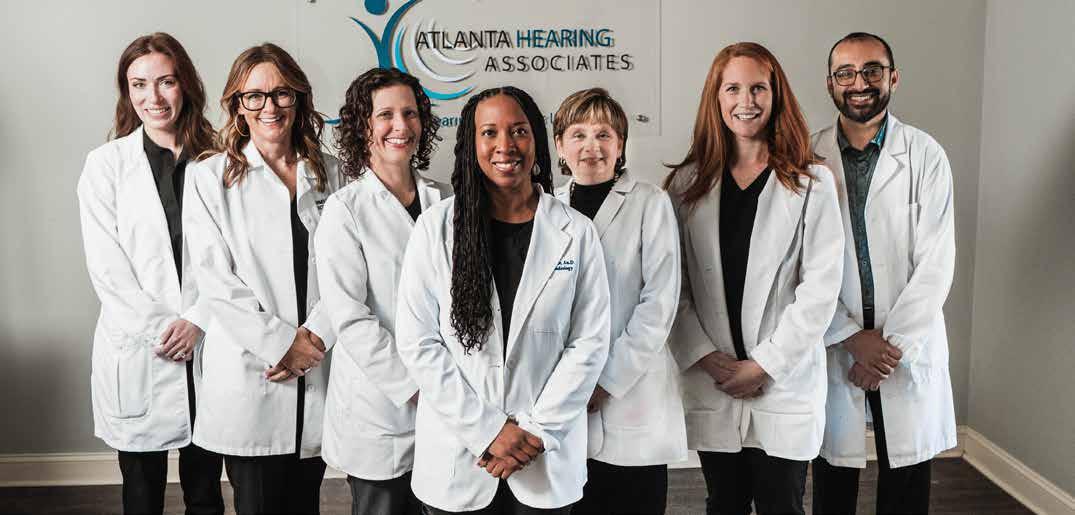





Backpack Buddies of Metro Atlanta celebrated the delivery of its one millionth meal, marking a major milestone in its mission to fight weekend hunger among food-insecure children. The event took place at Hightower Elementary School on April 24 and included a special meal delivery in partnership with the Robert D. Fowler YMCA, the Psi Omega Omega Chapter of Alpha Kappa Alpha Sorority, Inc., and Winters Chapel United Methodist Church.
The ceremony commemorated the incredible impact of delivering one million meals to children in need, and to highlight the power of community part-

nerships in addressing childhood hunger.
Compiled by AJT Staff

The Jewish Federation of Greater Atlanta and The Marcus Foundation congratulate the outstanding students selected as recipients of the 2025 Jewish Atlanta Merit Scholarship (JAMS) — a prestigious award that honors academic achievement, artistic and athletic talent, and leadership in our community.
The winners are as follows: Aaron Baldwin (Cliff Valley School); Arthur Millstein (Druid Hills Middle); Avery Shwartz (Davis Academy); Chloe Isakow (Atlanta Jewish Academy); Ella Siegel (Webb Ridge Middle); Elijah Cohen (Atlanta Jewish Academy); Eva Wolff (St. Francis School); Hayden Printz (St. Francis School); Mat-
thew Frank (Riverwood International Charter); Nadav Flusberg (Atlanta Jewish Academy); Sophia Mielnikowski (Dickerson Middle).
Mazel Tov to these remarkable students who will attend The Weber School or Atlanta Jewish Academy, where they will continue to grow, lead, and inspire.
The Jewish Federation of Greater Atlanta and The Marcus Foundation are proud to amplify the JAMS initiative to the community and are deeply grateful for the Zalik Foundation’s leadership and investment in advancing Jewish education in Atlanta.
Compiled by AJT Staff

On March 26, during Women’s History Month, Hadassah, the Women’s Zionist Organization of America, joined with Jewish Women International and the National Council of Jewish Women in hosting a reception on Capitol Hill, in partnership with State Rep. Debbie Wasserman Schutz, celebrating the leadership of the Jewish women of the 119th Congress. The honorees included Sen. Jacky Rosen and Reps. Schultz, Lois Frankel, Laura Friedman, Sara Jacobs, Kim Schrier and others.
These members of Congress were recognized for their leadership on issues ranging from protecting women’s health and reproductive rights to fighting hatred and antisemitism and championing the United States’ alliance with Israel. At the event, the hosts remembered and honored the late Rep. Nita Lowey, a remarkable Jewish woman leader and a trailblazer in Congress as the first women to chair the House Appropriations Committee.
“Hadassah is inspired by the incredible Jewish women in Congress who are
leading the charge to heal our world,” said Carol Ann Schwartz, National President, Hadassah. “We are proud to celebrate their accomplishments alongside our friends and partners at JWI and NCJW. Together, we continue to lift up the voices of women across the country to advocate for a strong US-Israel relationship, call for justice for the victims of sexual violence, advance reproductive choice and women’s health.”
Terry Nordin, president of Hadassah Greater Atlanta explains, “The Jewish women members of the 119th Congress are not just elected officials — they are our partners, our protectors, and our hope.”
Simone Wilker, advocacy chair for Hadassah Southeastern Region states, “These Jewish women are leading important efforts to heal our world and to advance initiatives to fight the antisemitism and hate.”
For more information about Hadassah Greater Atlanta, go to www.Hadassah.org.
Compiled by AJT Staff
By Robyn Spizman Gerson
Woodworkers are literally pouring out of the woodwork as The Jewish Woodworkers of Atlanta (JWW) emerges as a popular group attracting more than 50 members who gather to shmooze about their love of woodworking. With one year under their wings and monthly meetings on the first Sunday of each month, they recently featured two highly acclaimed woodworkers who presented their passion for the craft and outstanding careers.
The renown wood turner Philip Moulthrop, whose works are proudly displayed in the White House and Smithsonian, appeared in April. Dr. Abraham Tesser, who is a celebrated and accomplished woodworker residing in Athens, spoke to the group in May. Moulthrop and Tesser’s paths had previously crossed at a first-time ever regional exhibition in 2017. Dr. Tesser had envisioned a wood art show in his region that celebrated artistry in wood and gave the craftsmen he admired a place to show and sell their work. A representative of the Oconee

Culture Arts Foundation where he is a member asked if he’d consider curating a wood art show and “Wood Works 2017: A Regional Exhibition” was born.
Dr. Tesser, known to many as a retired research psychologist with extensive award-winning credentials, went to


work. Tesser curated the show with the medium of wood, high caliber, superb construction and a flawless finish. Philip and Matt Moulthrop, members of the recognized ‘first family’ in artistic wood turning in the U.S., agreed to participate,
plus Sabiha Mujtaba and Alf Sharp, important members of Tesser’s personal pantheon of furniture makers, and 40 outstanding artists.
Philip Moulthrop, well known to collectors, hails from one of the all-time greatest woodturning families, and is an artist from Marietta. He started woodturning in 1979, learning the basics of woodturning from his father, Ed, who was a pioneer in the wood-turning world. Philip’s son, Matt, has also followed in his footsteps, and the Moulthrop name has reached international acclaim.
Most famous for his large latheturned bowls and his pioneering composite technique, Philip has a BA from West Georgia College and Juris Doctor from the Woodrow Wilson College of Law. He studied and practiced law before beginning his artistic career, which ultimately became his lifelong passion. Moulthrop’s work resides in the collections of the High Museum, Museum of Arts and Design, Los Angeles County Museum of Art, the Mint Museum of Craft + Design, Renwick Gallery, and White House Collec-


tion of American Crafts.
Philip’s presentation was a huge hit at the JWW meeting in April featuring a slide show of his family history in the wood-turning world (father Ed and son Matt) as well as his techniques and specially designed and fabricated tools for perfecting his craft. He showed his processes from log harvesting, selection, rough cutting, drying, final turning to his famous minimal thickness walls and finishing. Afterwards, he took questions from the attendees, many of whom are woodturners themselves.
JWW member Doug Pisik, a nationally recognized artist, was inspired by Philip Moulthrop early in his career and commented, “I’m a full-time wood artist and, in 2007, was accepted into my first museum showing at the Marietta Cobb Museum of Art exhibiting two of my art boxes. Philip was at the opening with his talented son, Matt, and I’ve been a fan of his work and knew how important he was to the woodworking community. I was surprised when Philip asked me about my techniques. He was attentive, sincerely interested, and invited me to his workshop where he walked me through every step of his process. My first exhibition will always be memorable because of his interest, generosity, and I am thankful for the grace Philip continues to show to other woodworkers.”
At The Piedmont at Buckhead, you’ll encounter fascinating neighbors, stylish ambiance, chef-crafted cuisine, and a wide array of activities and clubs to embrace. If the dance of life has a hub, this is it.
his local synagogue, Congregation Children of Israel. Dr. Tesser’s groundbreaking contributions as a research psychologist increased the understanding of how people compare and evaluate themselves relative to others. His scholarly record and contributions have been recognized by many honors, including the Distinguished Scientific Contribution Award, the Distinguished Lifetime Career Award, and the NIMH Research Scientist Award.
Schedule a tour and embrace the retirement you imagine.
After retiring, Dr. Tesser turned his talents to studio art -- specifically creating beautiful furniture that has been featured across the Southeast, and development of a new certificate program in furniture design and fabrication at the UGA, bringing his artistry into the classroom. Dr. Tesser, along with his dedicated and accomplished wife, Carmen, who is a retired UGA professor of romance languages, have given generously to their community including endowing a cantorial position for their congregation.



Embrace the retirement you imagine. New friendships, new passions, new discoveries, and new freedoms.
RETIREMENT LIVING, REDEFINED.
Book a tour or RSVP for our upcoming event.
Next, thanks to a recommendation from Richard Friedman, one of the premier Bible scholars in the country and a former professor of Bible studies at UGA and friend, professor emeritus Abraham Tesser was recommended to JWW. Dr. Tesser graciously gave a presentation to the group entitled, “What is a Nice Jewish Boy doing in the Woodshop?” Tesser, who worked for 30 years as a research psychologist and academic career at UGA, retired in fall 1999, and became serious about woodworking following retirement. His award-winning works have been featured in woodworking books and magazines including Fine Woodworking.
In his local Jewish community, Tesser was the founding President of the Athens Jewish Film Festival, and is active in
Both events were a huge success and founder of JWW, Ed Gerson, commented, “JWW was so honored to have both Philip Moulthrop and Dr. Abraham Tesser spend time with our group as they are a credit to the field of woodworkers. We are a group of over 50 Jewish guys and a few women who take woodworking seriously. The legendary Moulthrop and Tesser are unparalleled examples of visionaries who mastered the craft, and we were truly honored that they agreed to spend time with us.”
He added, “We started as a small group of handy Jews who knew how to fix and create things and wanted an opportunity for comradery and sharing ideas. Some of us are retired and others work full- or part-time, ranging from lawyers, consultants, doctors, construction, technology and even one retired nuclear physicist. The one thing we all have in common is a love of woodworking and we are grateful to these icons for sharing their passion with us.”
To join the Jewish Wood Working group which is free and always open, send your name and woodworking interest to egerson@comcast.net. ì
SUNDAY, JUNE 1 st • 11:00AM-2:00PM
Join us as we soak up the summer vibes! Enjoy seasonal refreshments and hors d’oeuvres, listen to live reggae music, and explore our beautiful grounds and residences on a guided tour. Mingle with our friendly residents & staff as we celebrate the sunny season in style. Please call 470.681.9849 to RSVP.
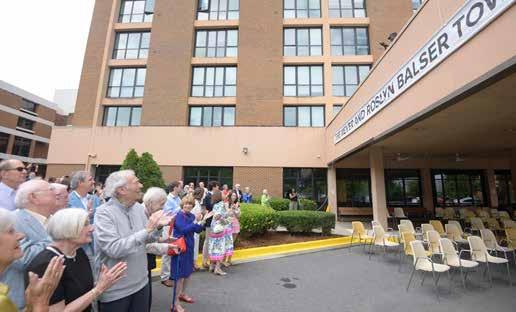

Jewish HomeLife, a senior care nonprofit originally founded by Atlanta’s Jewish community, has successfully raised more than $17.5 million in the quiet phase of its first capital campaign since the organization opened Berman Commons Assisted Living in 2015.
With Atlanta’s senior population expected to reach nearly one million by 2030, the need for affordable and trustworthy aging services is greater than ever. Nationally, more than 70 million baby boomers will be 65 or older by 2030, with increasing healthcare and housing needs. Jewish HomeLife’s Campaign for a New Age is designed to address these challenges by modernizing facilities, enhancing resident services, maintaining a high-quality workforce, and ensuring long-term sustainability.
Jewish HomeLife President and CEO Jeffrey A. Gopen explained why the organization launched such a large capital campaign so soon after the challenging years of the pandemic.
“The COVID-19 pandemic reshaped the senior care industry, with more individuals choosing to age at home until they can no longer delay transitioning to facilities with higher levels of care. At the same time, rising costs, reduced government subsidies, and competition from for-profit providers made sustaining a non-profit senior care like ours increasingly difficult. The Campaign for a New Age aimed to fortify Jewish HomeLife’s ability to provide exceptional care amidst these challenges.”
In 2024, Jewish HomeLife’s leadership, under the direction of Gopen, outlined a $15.25 million campaign focused on:
• Facility Renovations: Upgrading
physical structures to modernize and improve living spaces at The Balser and Zaban Towers (HUD-subsidized independent living) and at The William Breman Jewish Home, the organization’s flagship skilled nursing home.
• Sustainability: Ensuring long-term solutions through endowment funds and pilot programs that augment:
• Staff Support: Initiatives to enhance workforce retention
• Resident Support: Provide financial assistance to low-income seniors who are living longer and/or outliving their savings
• Resident Programming and Staff Training: Focused on enhancing care for our senior population, particularly those who have dementia.
The campaign included three key phases:
• Phase One (completed in 2024): included major infrastructure and unit renovations at The Meyer and Rosyln Balser Tower, supported by a $23.9 million HUD loan. This loan funded renovations of all 200 individual apartments which included new floors, windows, bathrooms, kitchens, HVAC, and plumbing.
• Phase Two (to be completed in Summer 2025): includes a new front entrance, renovations to all the common areas and every elevator lobby of the ninestory Balser Tower. The catalyst for this phase was made possible by the generosity of Ron and Barbara Balser and family, whose lead gift was the largest in Jewish HomeLife history and led to the renaming of the (former) Jewish Tower to The Meyer and Roslyn Balser Tower.
• Phase Three (set to begin in fall 2025): includes comprehensive renova-
tions at The William Breman Jewish Home and The Zaban Tower. Both these communities were last renovated in 2012.
In addition to renovations, the second component of the campaign focused on workforce development as well as resident enrichment and financial assistance.
For older adults, Jewish HomeLife already provides affordable housing to seniors through its HUD-subsidized independent living apartments. However, many individuals lack financial resources for additional care that would allow them to age in place. Thus, specific campaign dollars have been designated for scholarships that provide reduced cost in-home private care for independent seniors at The Balser and Zaban Towers. Additionally, these funds will be used for residents at Berman Commons Assisted Living who have begun to outlive their savings yet require significant additional care. Funds were also specially designated for enhancing care for seniors with Alzheimer’s and other forms of dementia. This includes more specialized training for staff and new, innovative tools to increase positive outcomes for these residents.
paign committee members include Nancy Canter Weiner, Fred Halperin, Martin Isenberg, Randy Korach, Sandy London, Deborah Maslia, John Perlman, Irwin Siegel, and Ricky Tinter.

Jewish HomeLife and President and CEO Jeffrey Gopen announced the organization raised more than $17.5 million in its capital Campaign for a New Age.
Campaign Co-Chair Candy Berman explained why she believes having support from the community is so important: “We always remember our Fifth Commandment, honoring our fathers and our mothers. Our ‘fathers and mothers’ are not limited to our own family; rather, it applies to our collective, community family. We believe that giving all seniors, regardless of their ethnic background or economic status, a dignified quality of life will only strengthen us as a people and fulfill the mitzvah of tzedakah, or charity, operating with justice, throughout the world.”
Jewish HomeLife has invited the community to join this historic campaign. By contributing, donors will directly support vital facility upgrades, enhanced programming, and provide long-term sustainability to one of Atlanta’s top senior care organizations that will serve Atlanta’s growing aging population for generations to come.
The campaign is co-chaired by longtime Jewish HomeLife supporters Candy and Steve Berman, who currently serve as Board Chair and Past Chair/Board Member Emeritus, respectively. Cam-
For more information on how to support the Campaign for a New Age, please visit www.JewishHomeLife.org/ donate or contact Stephanie Wyatt, Chief Development Officer, at 404.751.2269. ì
Compiled by AJT Staff

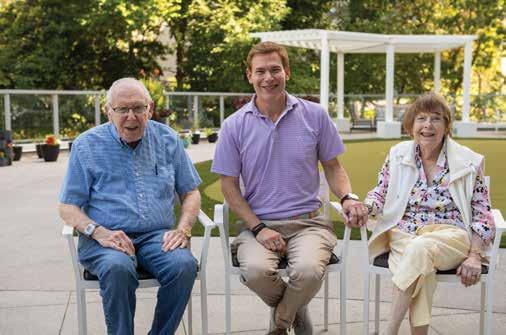

“The ability to transition from Active Independent Living to Assisted Living to Memory Care was a big deal for us so that they could be in one place. Heartis Buckhead was new, and the apartment was just gorgeous, so we thought it would make it a better transition moving from a house to an apartment. To have an apartment that’s so nice … we really thought the design, layout, everything was perfect.”

At Heartis Buckhead Senior Living, our residents and their loved ones become the storytellers, weaving a narrative that transcends words – a tale of local connection, friendship and an innate sense of belonging. Here, at Heartis Buckhead, it’s not just a place to live; it’s a place to truly belong and call home.





By Marcia Caller Jaffe
Nurit Kadoori, 97, remembers the day in 1950 when her family and fiancé scooped up what they could carry and shuttled off on a boat from Basra, Iraq, to Abadan, Iran, and onwards, to Tehran, Iran, by train.
The Jewish Agency (Sokhnut) facilitated the journey. Pogrom tactics were not subtle in Iraq in 1950-51 when the government wanted Jews expelled. Kadoori recalled, “First, they hung a Jewish teen in the Basra market, then they planted a bomb (albeit fake) in our synagogue. My parents had a thriving jewelry business, and the Jews (up until that point) were comfortable in Iraqi society. By ‘hook or by crook,’ we had to leave Iraq.”
In 1941, approximately 200 Jews were killed in the Farhoud pogrom. Her son, Danny, stated, “During that time, many Muslims protected Jews from the rampage perpetrated by their fellow citizens. Unlike the Jewish-European experience, the Jews of Iraq experienced fewer pogroms than their Jewish counterparts in Europe.”

Jews held high positions in Iraq and Mesopotamia (under Ottoman rule) as part of the educated class.
Thanks to American Jews, these refugees were resettled in Israel where Kadoori had family. Arriving in Haifa, they stayed in a refugee transit tent camp and eventually moved to Ramat Gan. The
Jewish-Iraqi exodus to Israel was code named Operation Ezra and Nehemiah. The large-scale migration went to Israel (now 450,000), less so to London and New York.
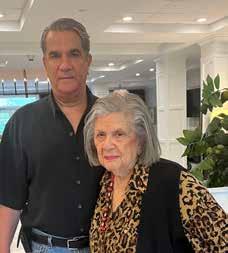
overlaps with Persian and Indian fare using cumin, curry, peppers, and fragrant spices.













Kadoori’s husband, Jamil (James), an internist, practiced for 16 years in Israel at a clinic and hospital. As a housewife, Kadoori found life in Israel “not pleasant, with lots of hard work and little food. Coming from a place of a reasonable abundance, it was hard to adjust. There was food rationing between 1949-59, but we managed.”
Dr. Kadoori wasn’t happy in his work where he wasn’t able to practice a “quality level of care.” Sad to leave family, Nurit packed up again for life in Long Island, N.Y., where they raised three children and stayed for 50 years before landing in Atlanta to be near resettled adult children.
Related to the prominent Sassoon and Kadoori families, Nurit explained that many Iraqi Jews escaped to China and India, where they established schools and synagogues.
Though fluent in English, sons Danny and Robert, a senior vice president at CBRE, speak to their mother in JudeoArabic, a dialect spoken by the Jewish Iraqi community. As a blend of ancient Hebrew, Aramaic, and Arabic, it’s also influenced by Turkish and Farsi.
Even while thriving in New York, the Kadoori’s ethnicity stuck with the Iraqi community, which sometimes included Iranian influence in synagogues. Although the Iraqi synagogue is set up like a Sephardic bimah, and men sit separately from women, Iraqi Jews are not “Spanish Sephardic,” but descendants from Babylon, where the Jewish community dates back to the sixth century BCE.
According to Danny, “Now for most, Judaism is practiced on the 'lighter’ side. The generation that came after the Iraqi exodus has intermarried with other communities.”


Kadoori’s healthy lifestyle starts with walking, reading, tuning into politics, sewing, knitting, beading, even doing her own manicure, eating ice cream and “anything else she wants in moderation.” No alcohol.





She laughed, “I live in an independent living building in Sandy Springs and socialize, but I don’t need the headache of dating. And the food here is not so great.”
Her memories of Iraqi “finger licking good” Shabbat meals start with stuffing a chicken with meat and rice, baking for six hours, and pouring eggs over it, alongside fried eggplant, more rice and exotic sweets like baklava. Iraqi food
The Babylonian Jewish population of the third to seventh centuries was one million making it the largest Jewish diaspora community. In 2014, Iraq was down to 500 Jews. As of 2021, the U.S. had 15,000, with 10,000 in England. Interestingly, during the reign of Sadam Hussein (1979-2003), antisemitic laws loosened, including travel restrictions, thus more Jews emigrated by choice. Now Ramat Gan, Givatayim, Kiyrat Gat, and Or Yehuda are strongholds for Iraqi life in Israel.
Recently interviewed by the Shoah Foundation, Kadoori is mentally and physically sharp, heading into the centenarian category. She stated, “I love America. Here we have the top of the line of everything.” ì
By Bob Bahr
Senior citizens or their families looking to move into independent living senior housing or assisted living will find fewer bargains this year in Atlanta. The consensus among experts who track the senior living market is that prices in the metropolitan area have tightened as the demand has rebounded after a substantial dip during the pandemic.
The metropolitan Atlanta area, which was overbuilt in recent years by an anticipated demand created by aging baby boomers has seen the glut of units begin to be absorbed.
Occupancy rates in well managed, well situated properties, hover around 90 percent or above, even in properties that are priced at the very top of the market.
All these changes are occurring at a time of economic change and increasing uncertainty about the future of the national economy. In a recent discussion of senior housing trends, Martin Atkin, a senior investment advisor for the Alliance Bernstein wealth management group, commented that since the beginning of the year, the chance of a recession has increased dramatically.
“The market appears to be pricing in more or less a 50 percent chance of recession,” Atkin comments. “We think, whereas at the beginning of the year, we’d have said a 15 percent likelihood of recession in 2025, now we say a 50 percent. So, it’s moved from not going to happen to likely to happen. Recession, technically, is two negative quarters of gross domestic product, or GDP growth.”
As demand has returned to the market, the development of new properties has slowed. The slowdown, in the opinion of experts, has been driven by rising material costs, labor shortages and now, in recent months, economic uncertainty.
According to the National Investment Center (NIC), which provides research and professional education to the senior housing industry, last year only 10,000 senior housing units were delivered in the U.S., the smallest number of new apartments in more than 10 years.
Despite all the discussions about the cuts in federal government spending during the first quarter of this year, Atkin believes that, taken together, total federal spending is not anticipated to change much.
“The administration’s Department of Government Efficiency, DOGE, exists, and potentially, they’ve cut some costs, but where they were working is at the margins,“ Atkin says. “The big contribu-

tors to spending at the federal government level are Social Security, Medicare, Medicaid, debt service, and the military. Everything else is a peanut compared to those five. Some people refer to the U.S. federal government as being an insurance company with a military wing. And none of that’s changing,”
And the trends in senior housing are also not likely to change anytime soon. NIC, as the research organization, says that in the first quarter of 2025 breaking ground for new units in the 31 primary markets in this country, including Atlanta, were at their lowest level since 2009.
At the same time, reports suggest that demand in the senior housing industry will grow by nearly $100 billion by 2027. The anticipated expansion is due to the growth of the population that was born in the decade-and-a-half after World War II reaches retirement age. It’s a population trend that is already being reflected in the market. Seniors increased by almost 39 percent from 2010 to 2020, the fastest growth in more than a century.
Even though there are more Americans reaching retirement age than ever before, the distribution of wealth is a lopsided statistic. While the longevity economy, as this segment of the market is termed, is valued at an eye popping $8.3 trillion annually, according to the Federal Reserve, 80 percent of these older households control only 20 percent of the wealth. A study by the Alliance for Lifetime Income last year reported that 53 percent of baby boomers who will turn 65 between now and 2030 have less than $250,000 in retirement assets.
Census statistics show that just over half of the estimated 73 million Americans reaching retirement age by 2030 won’t have a lot of money to live on. Ever
more dramatic by 2040, the population of those 80 and over, when senior housing and assisted living services begin to rapidly accelerate, will nearly double.
Unless all these trends are suddenly reversed, private investors who are responsible for much of the new construction in senior housing are likely to have
few choices on how they approach new projects. They can either put their money in a limited and shrinking luxury market, which is already apparent in new or expanded projects in Atlanta, or they can invest in a much broader, middle market where pricing and returns on investment are likely to be more problematic. ì
Thank you for Voting for us!

We offer Personal Care and Companion Care services to help your loved one feel connected and stay comfortable at home.
Personal Care
• Bathing and grooming
• Continence and bathroom assistance
• Ambulation and mobility
• Transferring and positioning
• Meal planning and preparation
• Walking and exercise
• Reminders of medication, events
• Other personalized services


Companion Care
• Meal planning and preparation
• Walking and exercise
• Reminders of medication, events, birthdays and more
• Other personalized services
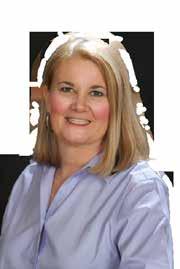
By Bob Bahr
Yossi Klein Halevi, the Israeli journalist, prize-winning author, and senior fellow of the Shalom Harman Institute in Jerusalem doesn’t believe that the shock of what happened on Oct. 7, 2023, is a temporary phenomenon. In a recent discussion sponsored by the Zalik Foundation at their Dupree building in Sandy Springs, he expressed the belief that it will resonate for at least another generation.
“Israelis always prided ourselves on not seeing ourselves in a Holocaust context, of not seeing this defenseless condition as being in any way relevant to us. But on Oct. 7, we experienced a relapse into powerlessness in the State of Israel.”
In one 24-hour period, he maintains, the promise that early Zionists made, that the state of Israel would be a safe refuge for Jews, came crashing down. The fact that more than a thousand Israeli civilians died defenseless, many in horrific ways, within the borders of Israel, without the immediate protection of the IDF, was, Halevi believes, a traumatic experience.
In a conversation with historian Ellie Schainker, a Jewish Studies scholar at Emory University, about “How Oct. 7 Changed the Jewish World,” Halevi noted that what occurred on that day recalled the memory of the helplessness that marked the Holocaust years.
“What Oct. 7 reopened was the trauma of the Holocaust,” he said, “and it forced us to realize that we haven’t really overcome the Holocaust and for me in particular, it was a very difficult revelation, because I’m working on a book whose subtitle is how the Jews overcame



the Holocaust, and I still believe that it’s more or less true, but I’m a little less certain than I was when I started writing this book five years ago.”
What lent the attack by Hamas particular power was its timing -- coming as it did, after an extended period of domestic political upheaval that was marked by deep divisions within Israel society. Those divisions only deepened when the Knesset passed a law in July of 2023 which limited the power of the country’s Supreme Court. Hundreds of thousands

of Israelis took to the streets to protest the law and the leadership of Prime Minister Benjamin Netanyahu.
“The year leading up to Oct. 7 we experienced a kind of a scenario,” Halevi notes, “of what the internal unraveling of Israel would look like, the country devouring itself, losing its minimal sense of solidarity, of shared purpose. We never experienced anything quite like the year leading up to Oct. 7, and then Oct. 7 comes, which was a kind of pre-enactment of, G-d forbid, the destruction of Israel from without.”
But despite all this and despite Halevi’s own misgivings about the state of the country’s political direction before Oct. 7, the Israeli author was impressed at how the country put all that aside on Oct. 8.
“One of the great achievements of Israeli society in our history was Oct. 8. Because what happened on Oct. 8 was not only that we came together, it was one of the peak moments of unity in the history of Israel, but we came together from the lowest point of schism that we had ever been in in nearly 80 years of our history.”
Moreover, what has particularly impressed Halevi was the response of Israel’s younger generation, what he said had been dismissed as “the TikTok generation.” On his podcast recorded
during Israel’s Independence Day, May 1 he admitted to his colleague, Donniel Hartman of the Hartman Institute. that before the terrorist invasion from Gaza there was some question as to whether young people had the right stuff. The question he said many asked, was, did the older generation impart the ethos of Israeli courage, of self-defense, of heroism to the next generation and did it all make a difference during this long war?
“They rose to the occasion immediately,” Halevi believes. “Some of these kids have been in uniform for 500 days, reservists, leaving their families, their work, their businesses, and taking up the burden of their generation’s role in the next phase of the Israeli story of Jewish history. And I’m so moved by them. You see their exhaustion and their determination, and we haven’t seen anything like this in a very long time.”
So, the challenge, as Halevi sees it, is that Israel has two models to choose once this war is over and the nation rebuilds for the future.
“We have Oct. 6, where we’re tearing ourselves apart. We have Oct. 8, where we instantly pivot to and relearn the instincts of peoplehood. I think most Israelis want to be in Oct. 8, a majority, maybe even a strong majority of Israelis want healing.” ì


By Bob Bahr
Pulitzer Prize-winning writer, Anne Applebaum, has spent the better part of her career writing about the history of political repression. In “Gulag,” which won her America’s top prize in journalism in 2004, she chronicled, in more than a thousand pages, the brutal Soviet prison system.
Eight years later, she wrote another 1,000-page work about how democracy was snuffed out in Eastern Europe in the decade following the Second World War. That book was a finalist for the National Book Award. Finally, she authored a critically acclaimed volume on Stalin’s brutally repressive campaign to collectivize agriculture in the Ukraine in the early 1930s.
In her decades-long immersion in the study of all this political violence in the 20th century, she came to know many of the present-day political activists in Russia and elsewhere. She used that to write two slender books about autocratic governments in the 21st century.


Her “Autocracy, Inc - The Dictators Who Want to Run The World” was the subject of a discussion last month at the Marcus Jewish Community Center of Atlanta (MJCCA). Coincidentally, a second work by Applebaum appeared, “Twilight of Democracy - The Seductive Lure of Authoritarianism.” She talked about her interest in the subject with Greg Bluestein, chief political writer for the Atlanta




Journal-Constitution.
“I spent a lot of time with people who are dissidents,” Applebaum said, “people who live in Russia or who live in Iran, or who work on projects and connect. I have a group of friends who have been working very hard to change Venezuela, and I realized over a number of years that I was learning a lot from them about the systems they oppose.”
She has studied the common goals that link perhaps as many as three dozen autocratic regimes around the world. They are loosely connected, not by political ideology but by their opposition to democracy and their desire to enhance the power they enjoy over their people.
They may be in a nationalist, capitalist state like Russia under Vladimir Putin or a left-wing socialist regime like Nicholas Maduro’s Venezuela or a theocracy like the Islamic Republic of Iran.
What all these nations have in common, Applebaum says, is their aversion to democracy. This was particularly true in China, which has flirted with a more open society in the past, and in Russia, which experienced a more liberal society after the fall of communism. Today, she says, that has changed.
“Gradually, they realized that these democratic ideas were dangerous to them,” Applebaum points out, “and they began shutting them off. And they began working on creating autocratic narratives that would undermine democracy. They began looking for ways to undermine the democratic world, militarily and in other ways as well.”
The leaders of all these nations don’t gather around a conference table to plot their subversion of democracy. The world she describes is less a James Bondlike movie and more like a loosely knit informal club whose members all share a desire to put down dissent within their
borders and enhance their power in the world, any way possible.
They sometime may provide economic help to one another, as when Russia helped to prop up the bankrupt Venezuelans or when North Korea exchanges information about rocketry with Iran, or when China exports its crowd control hardware and its computer surveillance software to other repressive regimes. These nations also support each other, Applebaum notes, with propaganda or disinformation on social media when it is useful, as in their support of Russia’s war in Ukraine. What they have achieved, she believes, is a serious challenge to world order.
Applebaum, who is a staff writer for The Atlantic and has been on the editorial board of The Washington Post, was asked how she thought the new administration was responding to these authoritarian challenges in the world.
“We do have,” she says, “for the first time, a president who's less sure that he wants this country to be the leader of the democratic world. We are pulling back from that, and we are changing the kind of language that we use on the world stage.”
Applebaum’s appearance here is the first in a new series of lectures to honor the memory of Dr. Charles Rosenberg and his wife, Bunny. The couple’s son, I.J. Rosenberg, a well-known, former sportswriter for the Atlanta Journal-Constitution, introduced Applebaum.
He indicated that the lecture series would continue this fall at The Book Festival of the MJCCA. Applebaum, who grew up in Washington, where her father is a prominent lawyer, is directly related to the Rosenberg family here, many of whom attended the lecture. Prior to her talk, she renewed family friendships at a VIP reception and afterwards signed copies of her new book. ì
By Bob Bahr
“Peter Pan,” the enduring Broadway musical classic about a young boy who never wants to grow up, returned to the Fox Theatre last month. The production is largely based on the 1954 smash hit that burnished the already legendary reputation of Mary Martin as the young boy who escapes to Neverland.
In a break with tradition, the title role in the Atlanta production is not played by a slender young woman but by a 17-year-old young man, Nolan Almeida.
The script, which was originally based on the J.M. Barrie play of the same name has been updated by the American Indian playwright, Larissa Fasthorse, to make the references to the indigenous people of Neverland and to some of the female characters more acceptable to modern sensibilities.
There’s even a program note in the Encore publication handed out to Atlanta theatergoers before the performance that acknowledges they are attending a theater that was built on land originally occupied by the Muskogee tribe.
There’s no special mention of the other tribe that the long success of this show celebrates. They form a long list of legendary Jewish creative Broadway innovators beginning with the brilliant stage genius, and original director, Jerome Robbins, born Jerome Rabinowitz in the Jewish Maternity Hospital on New York’s Lower East Side. The director of the Fox production is Lonny Price, a Broadway veteran with a long list of credits, who is also a member of the Tribe.
In the company that has been touring with the show


for almost the last year-and-a-half is Kurt Perry, whose material grandfather escaped the Holocaust in Nazi Germany and came to America in what must have seemed like a miraculous escape for him at the time. Perhaps it was so traumatic an escape from the threat of murderous reality that Perry said his grandfather remained silent about it during his lifetime. In fact, it was not until Perry was 21 that he pieced together how his grandfather had come to settle in the family home in Portland, Maine.
The discovery of his Jewish roots changed Perry’s life and led him to a return to Judaism, and a dedication to its teachings.
The origins of “Peter Pan,” with its magical escape from reality at the turn of the last century, must have also resonated with Jews who read Barrie’s story and saw his play.
In the early years of the 20th century, Jews dreamed of escape from a world that seemed set against them. The Zionist ideal of Theodor Herzl that caught fire at all levels of Jewish life then was, in part, a reaction against the antisemitism and injustice of the Alfred Dreyfus trial and his conviction in France. He was exonerated two years after “Peter Pan” first appeared on the stage.
An exhibition at the Israel Museum in Jerusalem a halfdozen years ago about “Peter Pan’s” origins delved into the meaning and intriguing story of this most beloved drama as a social and cultural phenomenon.
It took 50 years for the play to make its way from Edwardian Scotland to its most famous production in America. When it did, it was with music by Morris Isaac “Moose” Chalap, a Philadelphia Jew, and lyrics by the Bronx-born Carolyn Leigh, who was also Jewish.





During tryouts on the West Coast, it was felt that the show needed more music, so Jule Styne, born Julius Kerwin Stein, the son of Ukrainian Jewish immigrants, was brought in as was Berry Comden, born Basya Cohen in Brooklyn, and Adolph Green, whose parents were Hungarian Jews.
The iconic songs they all created, “I’m Flying,” “I’ve Gotta Crow,” “I Won’t Grow Up,” “Never Never Land,” and “Wendy” still envelop the audience with their warmth and magic, as they did at the performance this writer attended at The Fox.
The show, with its fantasy of escape and eternal youth, captured much of the childlike sense of wonder and adventure of the show, particularly for the many middle schoolers and their parents that filled the audience.
It has been more than 70 years since the original 1954 Broadway performance first made its way to television. It was an early color telecast on NBC that attracted a recordbreaking audience. The stars of the show, Cyril Ritchard, who played Captain Hook, and Mary Martin as Peter Pan, each won awards for their performances. Martin called it her favorite role.
It was rebroadcast four more times on network television over the next 25 years. Today, you can find it on YouTube, where it enchants a new generation of fans, just as it did here in Atlanta at The Fox. ì




Baby Talk: Newborn Social Small Group – 11 a.m. In this casual group setting, you’ll receive personalized advice and guidance. Parents will be supported by a perinatal specialist, an occupational therapist, mental health therapist, and Jewish educator. Our experts will cover topics such as newborn care, breastfeeding support, sleep strategies, managing stress, tummy time, baby development and more. In this series, information will be shared but not pushed so that parents can decide what works best for their family. Whether you’re a first-time parent or adding to your family, we can’t wait to say “Shalom” to you and your little one! RSVP at https://tinyurl. com/2ytw95w7.

35 + Singles Happy Hour – 6 to 8 p.m.
Join Kibbitz and Konnect at Mutation Brewing for an extended happy hour! Stop by after work for a craft beer and to meet other Jewish singles. RSVP early at https://tinyurl.com/snc7tzj9 for yourself and friends. Appetizers and cash bar. This event is open to young and mid-career professionals in their 30s through late 40s.

Thursday Night Live: An Israeli Independence Day Celebration –6:30 to 8:30 p.m. Join American Jewish Committee for a night of laughs, celebration, and community as we mark Israel’s Independence Day — Thursday Night Live style. We’re turning up the energy with stand-up comedy from Israeli comedian Yohay Sponder, bringing his sharp, witty, and totally relatable humor straight from Tel Aviv to ATL. Purchase tickets at https://tinyurl.com/37rf9t8d.
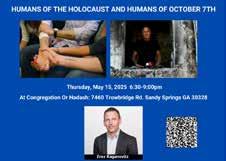
Humans of the Holocaust and Humans of October 7th – 6:30 to 9 p.m.
Join the Daffodil Project at Congregation Or Hadash for an in-person event with Erez Kaganovitz, Israeli photojournalist and creator of “Humans of the Holocaust” and “Humans of October 7th” exhibit. RSVP at https:// tinyurl.com/b8n3x6f2.
Friday, May 16
Lag B’ Omer Block Party – 5 to 6:45 p.m. Jump on a bounce house, check out a police car and fire truck and construction trucks and join a fun block party with the Mitzvah House. RSVP at https://tinyurl.com/4ry9ck4a.

Lag B’Omer Community BBQ – 5:30 p.m. Sizzling BBQ, gooey s’mores, drinks and a drum circle! Join us at Chabad Intown as we celebrate Lag B’Omer, the 33rd day of the Omer count, a festive day celebrated with bonfires and joyful events, a drum circle and more! Reserve your tickets at https://tinyurl.com/2n6cbhnp.

Saturday, May 17
Sing-along Shabbat with Etz Chaim Preschool - 10:30 a.m. to 12 p.m. Bring your child(ren) for a fun Shabbat morning sing-along with our preschool director, Lauren Chernau. Get more information at https://tinyurl. com/44ed9mr2.

Sunday, May 18
PJ Library Tiny Torah Time – 10:30 a.m. to 12:30 p.m. Celebrate Shavuot with a hands-on, toddler-friendly adventure! Perfect for ages 0-3 (older siblings welcome)! Register at https:// tinyurl.com/e3wpv77k.

Jewish Heritage Day at the Gwinnett Stripers – 1:05 to 4 p.m. American Jewish Committee (AJC) Atlanta is excited to partner with the Gwinnett Stripers for Jewish Heritage Day in celebration of Jewish American Heritage Month on Sunday, May 18, at 1:05 p.m. This will be a unique and enjoyable opportunity to celebrate Jewish joy with the minor league affiliate of the Atlanta Braves. The game presents a perfect opportunity to gather with friends and family. Secure your tickets at https://tinyurl.com/3svme9dx and be part of an unforgettable experience.

Let’s Talk about Sex with Dr. Mitchell Tepper- 4 to 7 p.m. Join Kibbitz & Konnect for an evening with noted sexologist and author Dr. Mitchell Tepper. Dr. Tepper holds a Master’s in public health from Yale and a PhD in human sexuality education from the University of Pennsylvania. He has been featured in The New York Times, USA Today, GQ, Glamour, as well as on CNN, PBS, and Discovery Channel. Appetizers and cash bar. We’ll be joined by Rabbi Brian Glusman in partnership with MJCCA. Rabbi Glusman has an advanced degree and post-graduate training in couples, family, and sex therapy from the Penn Council for Relationships, affiliated with the University of Pennsylvania, and has lectured extensively about Judaism and sexuality. Register at https://tinyurl.com/ mrhdu3jv.

Ron Segev, NOVA Survivor Shares His Story – 7 to 9 p.m. We welcome Ron Segev, Nova Festival survivor, to Atlanta and Congregation Etz Chaim, as he shares his moving story of survival and resilience on the day (October 7, 2023) that changed his life forever. Segev, 39, of Tel Aviv, has shared his testimony around the world and is an ambassador for the Tribe of Nova Festival. Please join us by RSVPing at https://tinyurl.com/mpbne87v for this impactful evening. RSVPs are required. No walk-ins.

Beyond the Stalemate: With Haviv
Rettig Gur – 6 to 9 p.m. Chabad Intown is proud to bring you an essential and timely discussion on Israel’s ongoing challenges and the path forward. Leading this conversation is one of Israel’s top political analysts and senior writers at The Times of Israel, Haviv Rettig Gur. Haviv is the go-to expert for breaking down Israel’s biggest challenges with clarity, depth, and real insight. This discussion will explore the Israeli mindset, the complexities of the conflict, and what it might take to rethink the path toward a peaceful future. Purchase tickets at https://tinyurl.com/mr4y5xza.
Torah Reading: Emor
Friday, May 16 Light Shabbat Candles at: 8:14 PM
Saturday, May 17 Shabbat Ends: 9:15 PM
Torah Reading: Behar-Bechukotai
Friday, May 23 Light Shabbat Candles at: 8:19 PM
Saturday, May 24 Shabbat Ends: 9:20 PM
Torah Reading: Bamidbar
Friday, May 30 Light Shabbat Candles at: 8:24 PM
Saturday, May 31 Shabbat Ends: 9:26 PM

Together Again at Sinai…preparing for Shavuot – 8:30 to 9:30 p.m. Join Unity Community Learning as the community in Toco and beyond gathers in unity for a special night of fastpaced learning… insights … and perspective as we all get ready to accept the Torah again. Eight extraordinary rabbis will present three 20-minute segments within the hour. Each will speak twice. It’s a friendly, inspiring way to get ready for Shavuot together. Yes, noshes and Maariv. Shavuos is coming, don’t snooze. RSVP at https:// tinyurl.com/25xzr4eb.
Thursday, May
Baby Talk: Newborn Social Small Group – 11 a.m. In this casual group setting, you’ll receive personalized advice and guidance. Parents will be supported by a perinatal specialist, an occupational therapist, mental health therapist, and Jewish educator. Our experts will cover topics such as newborn care, breastfeeding support, sleep strategies, managing stress, tummy time, baby development and more. In this series, information will be shared but not pushed so that parents can decide what works best for their family. Whether you’re a first-time parent or adding to your family, we can’t wait to say ‘Shalom’ to you and your little one! RSVP at https://tinyurl. com/2ytw95w7.
Tot Shabbat - 6 to 8 p.m. Tot Shabbat is a Shabbat program geared for children (second grade and younger) to laugh, meet new children, make new friends, and explore the wonders of Judaism in an exciting fun way! The service is filled with songs, prayers, blessings, stories, snacks, and a place where a kid can be a kid when they pray to G-d. This Congregation Dor Tamid service meets on selected Friday nights throughout the year at 6 pm. Each service is followed by a pot-luck Shabbat dinner. RSVP at https://bit.ly/3KW9PMj.

Scholar-in-Residence with Rabbi David Goodman – 7 to 9 p.m. Join Ahavath Achim Synagogue for an evening of learning, connection, and reminiscence as we welcome Rabbi David Goodman, grandson of the beloved Rabbi Arnold Goodman (z”l), who served as Rabbi of Ahavath Achim Synagogue from 1982–2002. Together, we’ll honor his legacy through reflection, connection, and inspired learning. The evening’s topic of discussion will be “Resilience and Renewal: Rabbi Akiva’s Legacy After Tragedy.” After the tragic loss of 24,000 students, Rabbi Akiva faced a crossroads. Rather than yielding to despair, he chose to rebuild—with just five new students who would go on to shape the future of Jewish life and learning. Together, we'll explore how this ancient story continues to offer profound guidance on perseverance, purpose, and the enduring power of renewal. The event is free to attend, but registration is required at https://tinyurl.com/y855a6hz
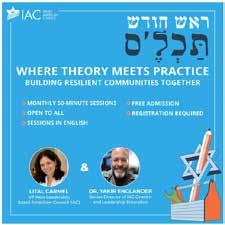
Rosh Chodesh TACHLES - 8 to 9 p.m. Gvanim alumni? You are at the heart of our community activity and philanthropy. To support you in these endeavors, Israeli-American Council (IAC) would like to invite you to a unique talk series. Each talk will feature an expert, thought leader, or entrepreneur who will guide us in building community initiatives, expose us to innovative leadership tools, and delve into critical community topics. Join Gvanim enthusiasts from coast to coast, Free of Charge. Visit https:// tinyurl.com/3uvp9rm4 to register and get the Zoom link.

Baby Talk: Newborn Social Small Group – 11 a.m. In this casual group setting, you’ll receive personalized advice and guidance. Parents will be supported by a perinatal specialist, an occupational therapist, mental health therapist, and Jewish educator. Our experts will cover topics such as newborn care, breastfeeding support, sleep strategies, managing stress, tummy time, baby development and more. In this series, information will be shared but not pushed so that parents can decide what works best for their family. Whether you’re a first-time parent or adding to your family, we can’t wait to say ‘Shalom’ to you and your little one! RSVP at https://tinyurl. com/2ytw95w7.


Ingredients
Chicken
10 chicken drumsticks
4 cubes Gefen Frozen Garlic
4 cubes Gefen Frozen Parsley
4 cubes Gefen Frozen Dill
1 tablespoon oil juice of 1 lemon or 3 tablespoons Gefen Lemon Juice salt, to taste pepper, to taste
Rice
2 cups rice
3 and 1/2 cups water
2 tablespoons chicken consommé salt, to taste pepper, to taste
Directions
1. In a ziplock bag, combine the chicken drumsticks, garlic cubes, parsley cubes, dill cubes, lemon juice, oil, salt, and pepper. Seal the bag and refrigerate for at least one hour, or preferably overnight, to marinate.
2. Preheat the oven to 375 degrees Fahrenheit.
3. In a large baking dish, spread the rice evenly across the bottom. Pour in the water, chicken consommé, and season with salt and pepper.
4. Arrange the marinated chicken drumsticks on top of the rice, ensuring they are evenly spaced.
5. Cover the dish tightly with aluminum foil.
6. Bake in the preheated oven for one hour.
7. After one hour, remove the foil and check the chicken for doneness. If needed, bake uncovered for an additional 10-15 minutes until the chicken reaches an internal temperature of 165 degrees Fahrenheit and the rice is fully cooked.
Recipe by Shaindy Siff Kosher.com
Joseph had just passed his driving test, so he asked his father, who was a rabbi, if they could discuss the use of the car. His father took Joseph to his study and said, “Joseph, I’ll make a deal with you. You bring your school grades up, study your Bible a little, get your hair cut, and we’ll talk about it.”
After about a month, Joseph came back and again asked his father if they could discuss use of the car.
They again went to the father’s study where his father said, “Joseph, I’ve been real proud of you. You have raised your school grades, you’ve studied your Bible diligently, but you didn’t get your hair cut.”
Joseph replied, “You know, I’ve been thinking about that. Samson had long hair, Abraham had long hair, Noah had long hair, and even Moses had long hair.”
To which his father replied, “Yes, and they walked everywhere they went!”
n. A person who delights in rooting out spoiled items in the refrigerator, particularly the refrigerator of someone they are visiting.
“Oy vey, somebody get Aunt Sonia out of our kitchen or she’ll throw out this morning’s milk because she thinks it smells funny. She’s the family’s farfoilt finder.”
From the Yiddish “farfoilt,” meaning “spoiled” or “rotten.”
Joseph Allan Arnold was born July 1, 1931, at the zenith of The Great Depression. He did not know how poor he was until later in life. He did know that none of his five older siblings owned an automobile. When asked about her family, his mother would say that she had “five children and a doctor.”
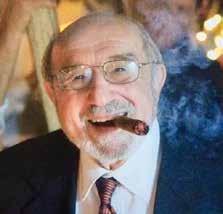
Joe’s parents, Bernard and Addie Arnold, were older when he was born as his father was 56 and his mother, 43. His father had a dry goods store on Decatur Street which was lost in the Depression, so he peddled gold and silver door-to-door until he got a job at Mel Gudell’s Mitchell Street liquor store. His father, Bernard, was born in Moscow in 1875, one of the few Jews allowed to live in there. His mother, Addie Lefkoff, was born in Atlanta in 1888, the same year as T.S. Eliot and the completion of The Eiffel Tower. Addie claimed to be the first Eastern European girl born in Atlanta (at that time, Germany was in the West).
Joe was essentially raised by his oldest brother, Sam, who was 17 years older. Joe’s father died just a few weeks before Joe’s bar mitzvah, which took place at the Shearith Israel synagogue, where he closely identified with Rabbi Hyman Friedman and Cantor Paskin (who recognized his baritone voice leading to his singing in choirs for 25 years).
Throughout high school, Joe worked weekends at Star Loan Company under the tutelage of Bernard (Buster) Cohen who, unbeknownst to him, was somewhat of a father figure. At about that time (age 17) Joe met and fell in love with his future wife, Phyllis Edith Gershon, but that love was not consummated for another 13 years, when her fa-

ther, Sam Gershon, told Phyllis, “Get that boy.”
Joe was valedictorian at his graduation from Hoke Smith High School and was awarded a scholarship to Emory University and a Naval ROTC scholarship to the University of North Carolina at Chapel Hill. At UNC, he earned a degree in mathematics and was, again, named valedictorian of his class and was invited to join Phi Beta Kappa. Upon his graduation, he was commissioned as an engineering officer in the U.S. Navy during the Korean conflict and he traveled to several European countries and the Far East.
Following his military service, Joe enrolled in The Medical College of Georgia with a specialization in family medicine. He did a one-year residency at the U.S. Naval Hospital in Charleston, S.C., before returning home to Atlanta. It was while he was working in the emergency room at what was then DeKalb General Hospital that he reconnected with Phyllis, who had come to seek medical care. She expressed her appreciation for his attentiveness with a six-month subscription to National Geographic and a lifelong relationship ensued.
To this day, his former patients bemoan the fact that Dr. Joe, aka, “the Singing Doctor,” finally made the difficult decision to retire at the age of 80. They miss the thorough and conscientious care they received as he would listen to their concerns and diligently record them in hand-written medical records. Joe was a diagnostician beyond compare. He treated each and every patient with care and concern. His whistling and humming filled the hallway with music and soothed any discomfort that his patients may have been experiencing. His passion for helping others and his desire to ease pain were the guiding principles by which Joe lived, and he was supported in this work by his partner in all things, Phyllis.
Joe and Phyllis had a love affair for the ages; they married in 1962 and, together, raised five children who revere them. Their partnership exemplified loving kindness and mutual respect. Through thick and thin, they supported each other and, quite literally, never left one another’s side. Joe remained Phyllis’ steadfast companion throughout her illnesses and knew that she loved him as much as he loved her.
Of course, we would be remiss if we didn’t mention Joe’s many interests. He was an ardent supporter of the Jewish and secular communities. Additionally, he was an avid coin and stamp collector and tennis player. He loved listening to classical music, exploring cemeteries, riding his bike, and taking walks in the woods. Above all, Joe was a student -- he loved learning, and it was not uncommon to find him surrounded by his books as he researched various topics.
Joe is predeceased by wife, Phyllis, as well as his parents, Bernard and Addie Arnold, and his siblings, Sam Arnold (Sara Kennedy), Charlotte Idov Rich (Morris), Sarah Ellison (Jerome), Reuben Arnold (Sarah) and Phillip Arnold (Sylvia). Survivors include his children, Leslie Hammond (Richard); Kim Massell (Joanna Stamatiades); Beth Arnold Helmey; Mark Arnold (Julie) and Dan Arnold (Debbie). He is adored by his grandchildren: Dustin Hammond, Jacob Hammond, Maya Baumeister, Sam Helmey, Hannah Helmey, Jack Arnold, Eva Arnold, Emily Arnold, and Lila Arnold.
We express our most sincere gratitude to his caregivers: Comar, Eda and Laree, who treated him with dignity, compassion and loving kindness. We would also like to acknowledge the care he received from Longleaf Hospice.
Funeral services were held at Ahavath Achim Synagogue (600 Peachtree Battle Avenue, NW) on Thursday, May 8 at 1p.m., followed by burial at Greenwood Cemetery (1173 Cascade Circle, SW). Donations in Joe’s memory may be made to an organization that does meaningful work to make the world a better place and to ensure that a culture of music, nature, and learning are alive and vibrant for generations to come.

Ellen Feinberg, 88, of Atlanta, Ga. passed away on May 5, 2025. She was a retired schoolteacher. Ellen is predeceased by her husband, Randy Feinberg. She is survived by her sister, Margie Sonshein, her children, Rick and Micki Falcon, Ken Feinberg; her grandkids, Max, Emma and Perry Falcon, Mia and Drew Smith, Stella Feinberg and Anauka Feinberg. The funeral was held at 10 a.m., Wednesday, May 7, 2025, at Arlington with Rabbi Max Miller officiating. Arrangements by Dressler’s, 770-451-4999
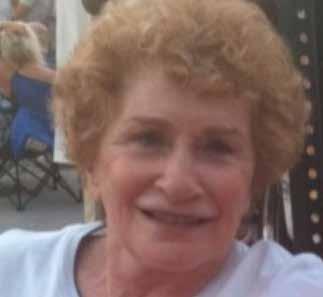
Cecile Felsenthal Prager, born Dec. 25, 1939, in Memphis, Tenn., passed away peacefully at her home on May 6, 2025, surrounded by her family. Cecile was a wonderful daughter, sister, friend, wife, partner, mother, grandmother and great-grandmother. Nothing brought Cecile more joy than her six grandchildren. Family was everything to Cecile, so she moved from her beloved Memphis after the death of her husband to Atlanta to be near the grandchildren. She loved being involved in their lives and her grandchildren adored having her nearby.
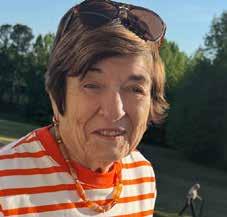
A graduate of Tulane University and the University of Memphis, Cecile was a longtime educator with a specialty in reading. She was always a teacher at heart. Cecile taught thousands of people to read. Her favorite moments came when she taught an adult, particularly a senior citizen, to read for the first time. She worked for several nonprofits including Memphis Partners and Junior Achievement as well as volunteering with the NCJW. In 2018, Reach Memphis honored Cecile for her work with Memphis Prep and recognized the key role she played in building the program. In Atlanta, Cecile was an active volunteer with LaAmistad and The Temple.
Jewish life and Judaism were especially important to Cecile. Upon moving to Atlanta, she began teaching first grade at The Temple’s religious school. In doing so, she was able to have four of her six grandchildren as students over the years. Cecile partook in the Melton Institute courses at The Temple and MJCCA as well as studying for and becoming a bat mitzvah through The Temple. Additionally, Cecile served on the board of directors for both The Temple and Temple Israel in Memphis.
Cecile was preceded in death by her husband, Beirne M. Prager, Jr. She is survived by her children, Lynn (Barry) Deutsch, Susan (Brian) Banner, and Nancy Prager; her grandchildren, Ben (Sophie), Michael, and Rebecca (Brandon Alaniz) Deutsch, and Bradley, Henry, and Anna Banner; and one great-grandchild. She is also survived by her brother, Eddie (Gloria) Felsenthal; her partner, Dr. Elliott Goldstein; and many beloved nieces and nephews.
Cecile embraced the motto, “Bloom Where You Are Planted,” and she truly lived by it — thriving in both Memphis and Atlanta and enriching the lives of all who knew her. Donations in Cecile’s memory can be made to The Temple’s Bremen’s Education Center Fund at https://www.the-temple.org/tribute-funds.

Alexandra Rose Suresky, 32, passed away on April 23, 2025, unexpectedly at home (Atlanta, Ga). Ali could be described as talented, energetic, and caring. She was born in Decatur, Ga., and lived most of her life in the Atlanta area. She graduated valedictorian of her class at Ben Franklin Academy in 2011. She attended Sarah Lawrence College in Bronxville, N.Y. Throughout her life, she showed her creativity in everything she did. She wrote, produced, and directed her play entitled, “Sword Cutting Daisies,” which made three performances at the Atlanta Fringe Festival. She coordinated screenplay, stage production, and special effects. She addressed challenges head on in the best way she knew how.
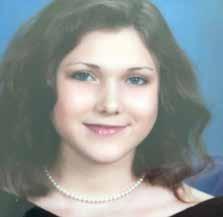
Alexandra is survived by her parents, Marcela Cardoso and Peter Suresky of Atlanta, her brothers, Jordan and Nicolas Suresky, her grandparents, Shelby and Alvaro Cardoso of Atlanta, her uncle, Joseph (Lorraine) Suresky of Goshen, N.Y., her aunt, Suzanne (Paul) Passeri of Danvers, Mass., her cousins, Gregory (Elizabeth) Passeri, Julianne (Guy) Passeri Mitrano, Jared (Garima Dhingra) Suresky, Rachel (Elise Seyforth) Suresky, and several second cousins (too numerous to list here). Alexandra is pre-deceased by her grandparents, Helen and Harold Suresky of Naples, Fla.
Funeral services were held in a private ceremony officiated by Rabbis Jason Holtz and Harvey Winokur (Roswell, Ga.) at Green Lawn Cemetery, Roswell, Ga.
The family requests memorial contributions made to Temple Kehillat Chaim. 1145 Green Street, Roswell, GA 30075. Online condolences may be expressed at www. roswellfuneralhome.com.

Obituaries in the AJT are written and paid for by the families; contact Editor and Managing Publisher Kaylene Ladinsky at kaylene@atljewishtimes.com or 404-883-2130, ext. 100, for details about submission, rates and payments. Death notices, which provide basic details, are free and run as space is available; send submissions to editor@atljewishtimes.com.































